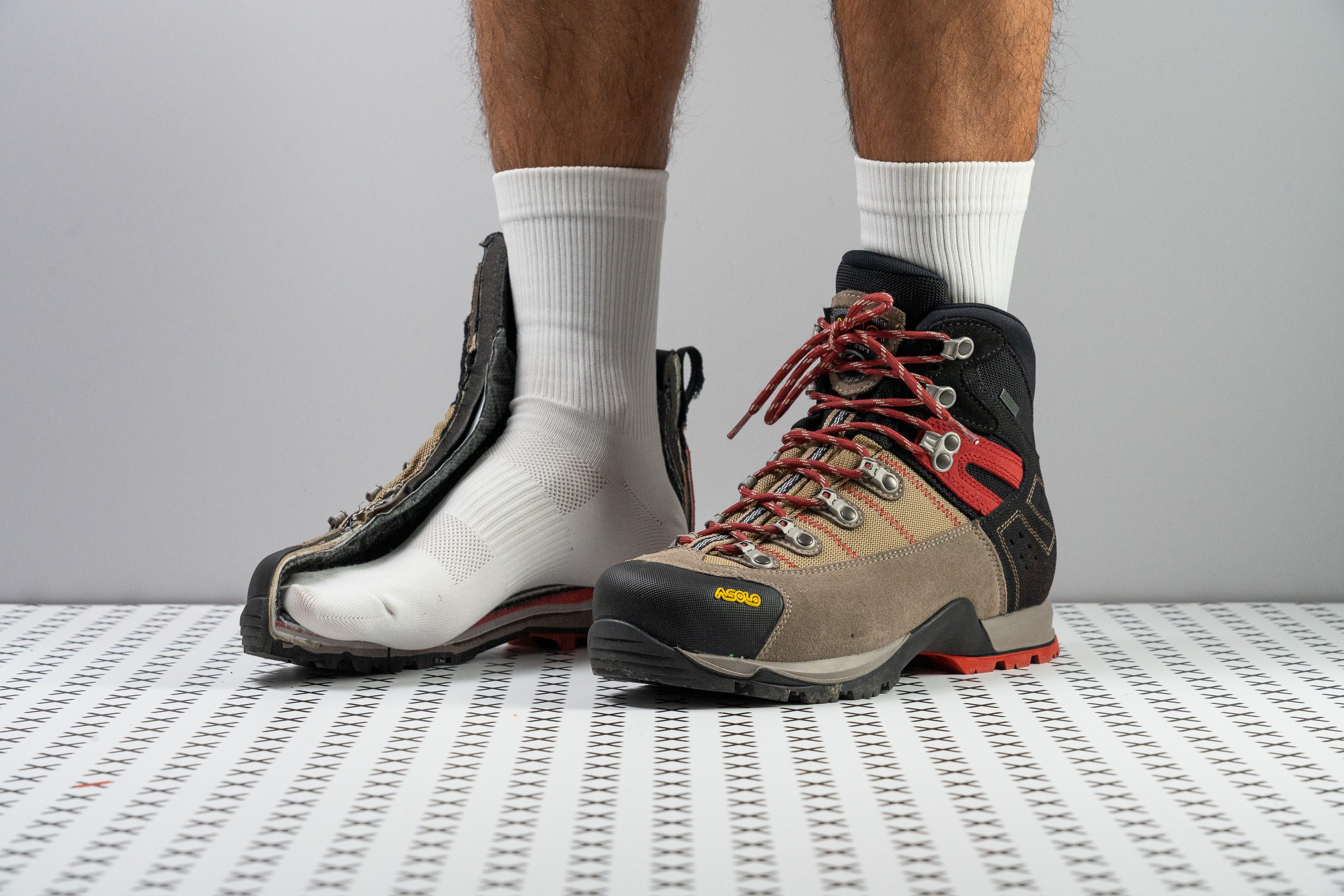Our verdict
- Top pick in best backpacking boots
- Top pick in best winter hiking boots
Pros
- Great grip on mixed terrain
- Fantastic underfoot protection
- Worth the price
- Waterproof
- Reliably supportive
- Feels light on the foot
- Zero break-in
- Balance preserver
Cons
- Outsole started peeling off
- Not-so-cushy footbed
Audience verdict
- Top 1% in Asolo hiking boots
Comparison
The most similar hiking boots compared
+ + Add a shoe | |||||
|---|---|---|---|---|---|
| Audience score | 88 Great! | 88 Great! | 84 Good! | 77 Decent! | |
| Price | $300 | $170 | $230 | $229 | |
| Trail terrain | Moderate | Moderate | Technical | ModerateTechnical | |
| Shock absorption | Low | - | Low | - | |
| Energy return | Moderate | - | Moderate | - | |
| Weight lab Weight brand | 24.8 oz / 704g 24.3 oz / 690g | 21.7 oz / 615g 20.9 oz / 592g | 23.4 oz / 663g 23.1 oz / 655g | 20.6 oz / 583g 20.6 oz / 585g | |
| Breathability | Warm | Warm | Warm | Warm | |
| Use | BackpackingDay Hiking | BackpackingDay Hiking | BackpackingDay HikingSnow | BackpackingDay HikingSnow | |
| Orthotic friendly | ✓ | ✓ | ✓ | ✓ | |
| Drop lab | 20.0 mm | 16.7 mm | 18.0 mm | 14.0 mm | |
| Size | True to size | True to size | True to size | Slightly small | |
| Midsole softness | Firm | Soft | Balanced | Balanced | |
| Difference in midsole softness in cold | Normal | Normal | Normal | Small | |
| Heel counter stiffness | Stiff | Moderate | Stiff | Moderate | |
| Stiffness | Moderate | Stiff | Stiff | Moderate | |
| Outsole hardness | Average | Very hard | Average | Hard | |
| Waterproofing | Waterproof | Waterproof | Waterproof | Waterproof | |
| Material | Suede | Leather | Textile | Suede | |
| Season | Winter | Winter | Winter | Winter | |
| Toebox durability | Good | Good | Good | Good | |
| Heel padding durability | Decent | Decent | Good | Decent | |
| Outsole durability | Decent | Bad | Decent | Good | |
| Width / fit | Medium | Wide | Wide | Medium | |
| Toebox width | Narrow | Wide | Medium | Narrow | |
| Lug depth | 3.6 mm | 3.6 mm | 4.7 mm | 4.0 mm | |
| Heel stack lab | 42.1 mm | 41.0 mm | 38.0 mm | 34.2 mm | |
| Forefoot | 22.1 mm | 24.3 mm | 20.0 mm | 20.2 mm | |
| Widths available | NormalWide | NormalWide | Normal | Normal | |
| Technology | Gore-Tex | - | Gore-TexOrtholite | Gore-TexVibram | |
| Cut | Mid cut | Mid cut | High cut | Mid cut | |
| Removable insole | ✓ | ✓ | ✓ | ✓ | |
| Ranking | #14 Top 35% | #16 Top 40% | #25 Bottom 39% | #39 Bottom 4% | |
| Popularity | #15 Top 37% | #31 Bottom 24% | #9 Top 22% | #41 Bottom 1% |
Who should buy
We recommend the Asolo Fugitive GTX as an excellent companion to:
- Hikers of all experience levels who frequently encounter rocky ascents or descents
- Backpackers looking for a supportive and stable boot for their multi-day adventures
- Those who prioritize underfoot security and want a well-cushioned and protective boot
- Adventurers looking for a secure and grippy boot that can also tackle some light climbing
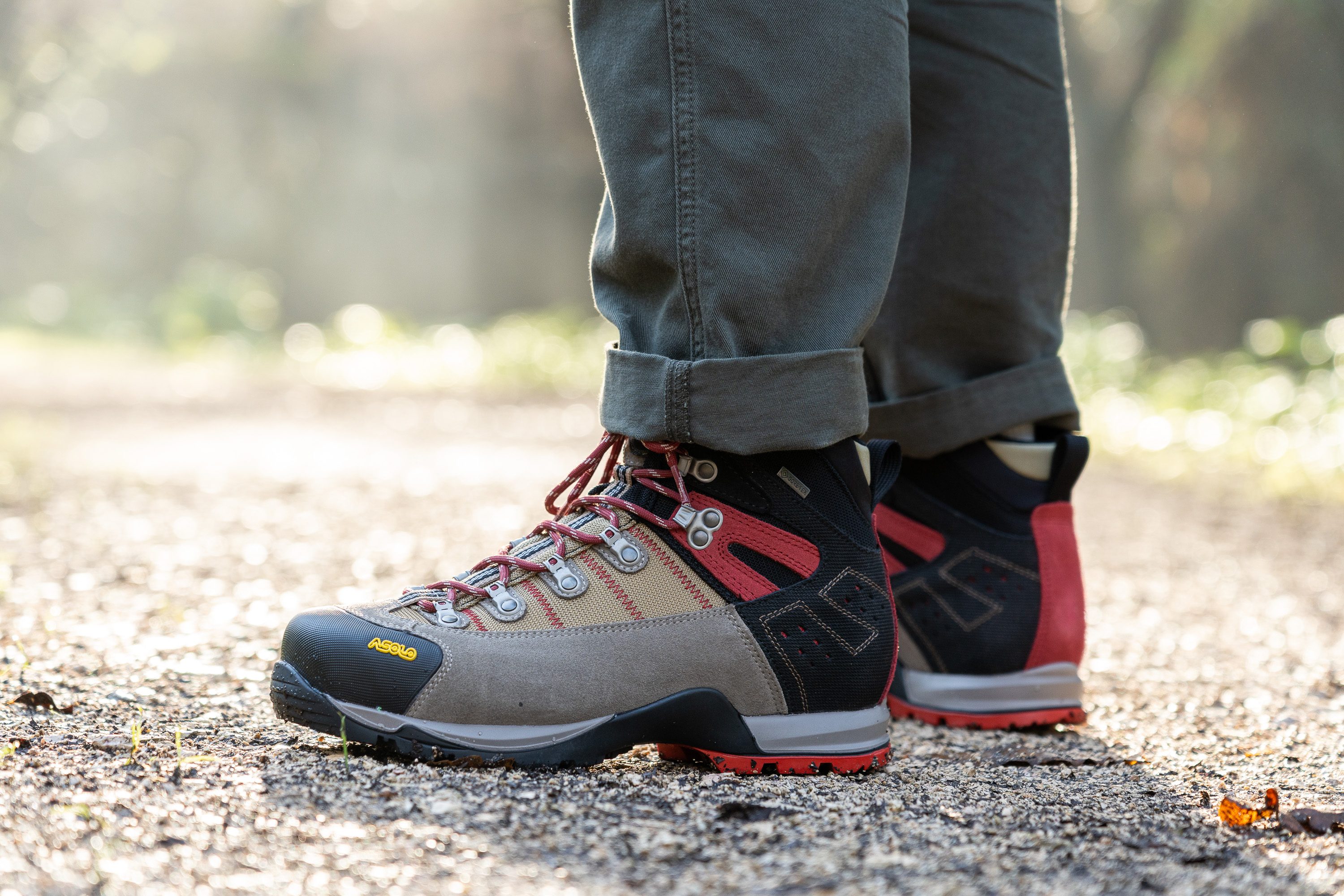
Who should NOT buy
While the Fugitive GTX’s outsole rubber withstood our Dremel tests quite well, the fact that the outsole began separating from the midsole after only a handful of test hikes indicates relatively poor quality. For a more well-constructed boot, we recommend looking into the Salomon Quest 4 GTX instead.
The Fugitive GTX’s toebox may prove to be a little too snug for those with broad feet. For a more accommodating alternative, check out the roomier Keen Targhee III Waterproof Mid instead.
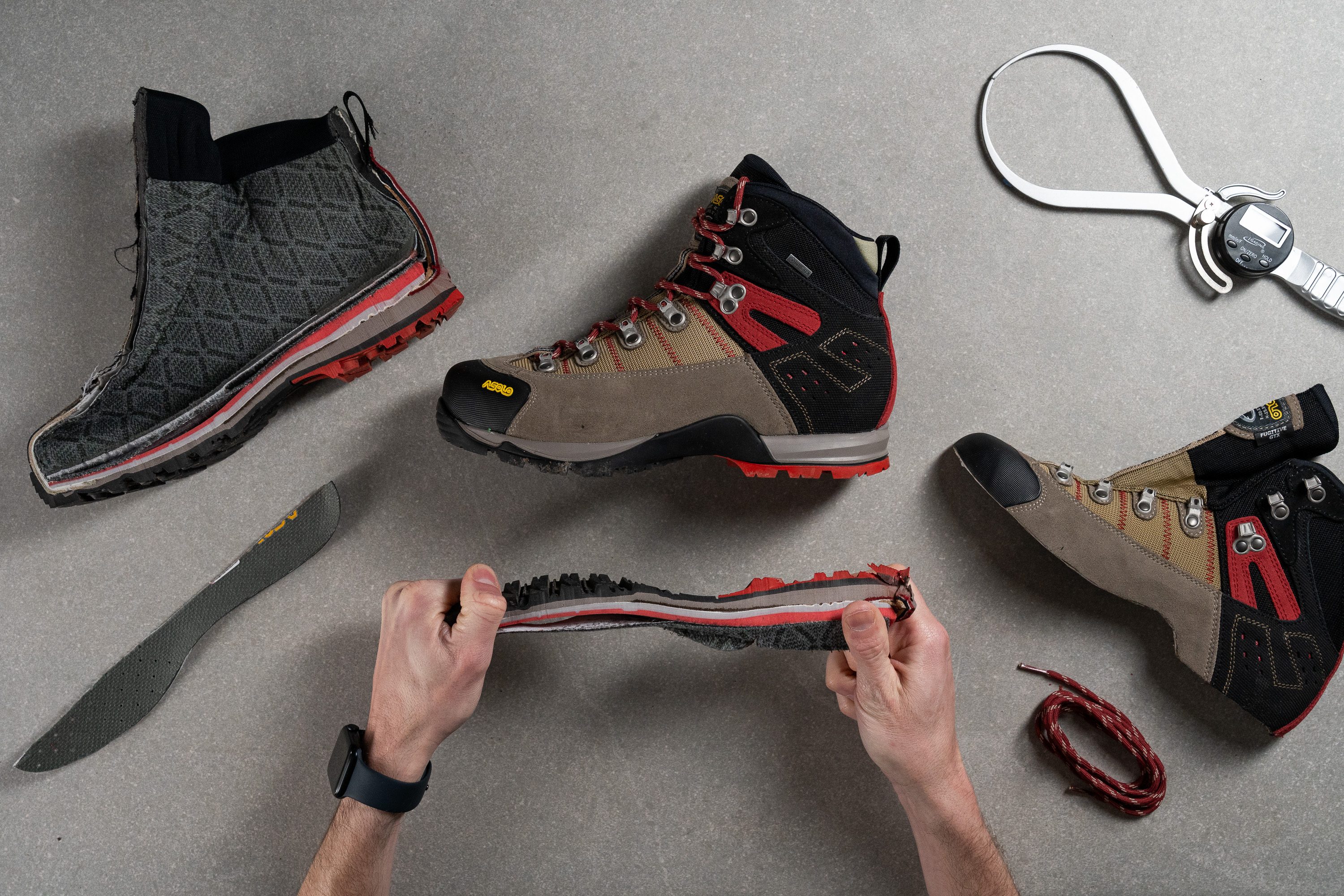
From its chunky midsole to the generous amount of outsole rubber, the Fugitive GTX could certainly use a diet. For hikers who prefer a more lightweight ride, we recommend the Hoka Trail Code GTX instead.
Cushioning
Shock absorption
Stability on technical terrain is the primary focus for the Asolo Fugitive GTX. Its underfoot cushioning is limited in favor of more precise foot placement and control on unpredictable and shifty ground like scree. That's why this boot showed some of the lowest shock absorption scores in our lab - only 56 SA.
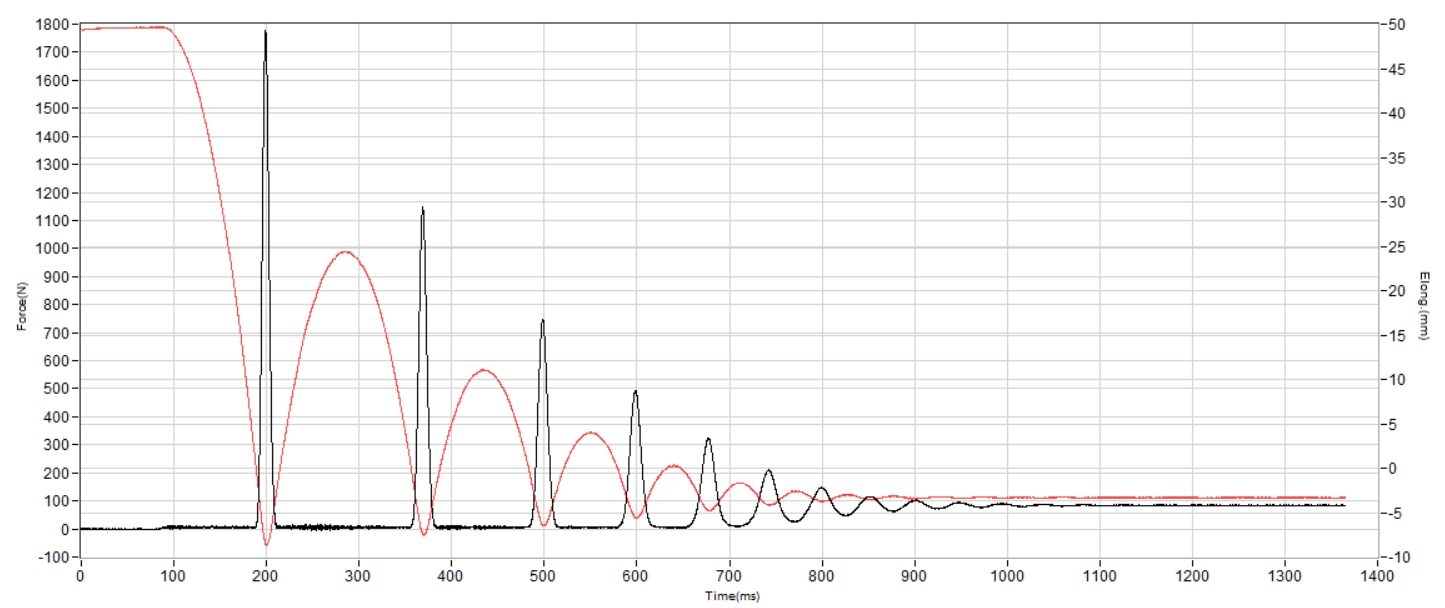
| Fugitive GTX | 56 SA |
| Average | 93 SA |
Energy return
However, the boot's ride doesn't feel dull at all! Measuring the Fugitive GTX's energy return, we got an above-average reading of 54.7% which reflects the touch of springback it provides. It helps to add some life to this otherwise heavy and stout Asolo boot.
| Fugitive GTX | 54.7% |
| Average | 50.5% |
Heel stack
Also contributing to the Fugitive GTX’s heft is its gargantuan heel stack which we measured with our caliper to be 42.1 mm thick.
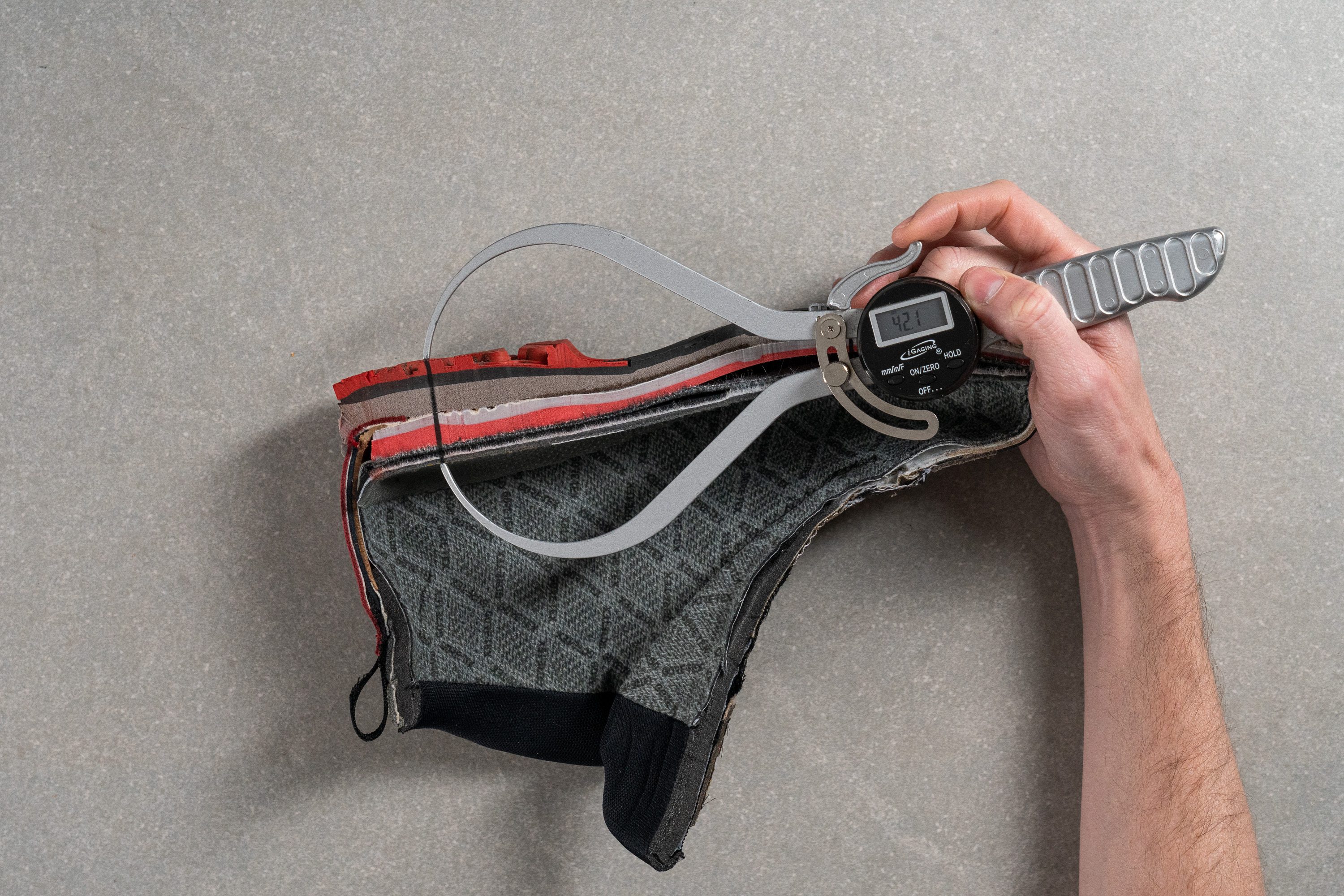
This is quite a bit higher than our current lab average and kept us nice and elevated from the hazards of the trail below when taking this boot out for a spin.
| Fugitive GTX | 42.1 mm |
| Average | 36.3 mm |
Forefoot stack
The forefoot is much closer to the ground by comparison at 22.1 mm thick according to our caliper measurements.
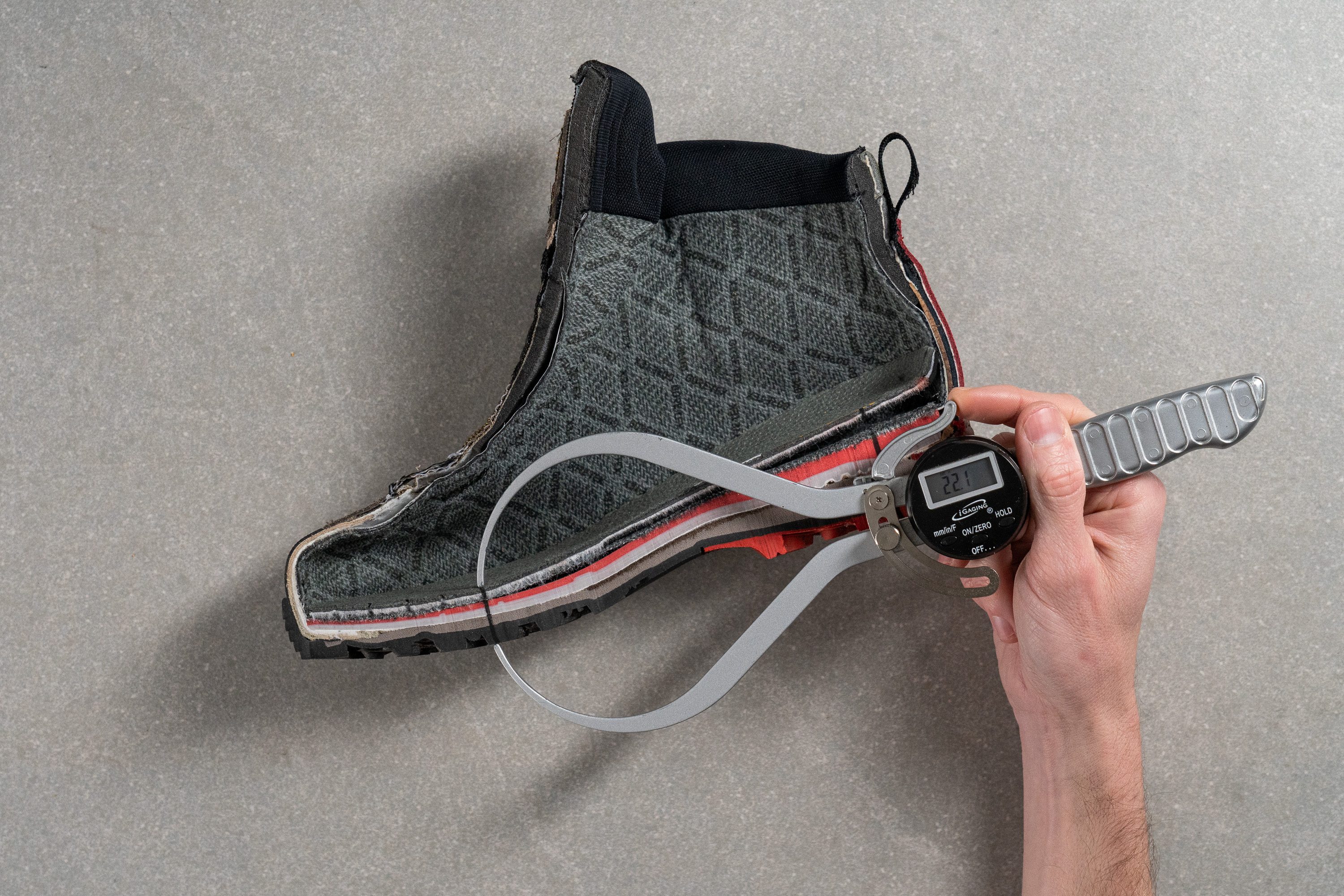
This is on par with our current lab average and provides us with a healthy mix of protective cushioning and ground feel.
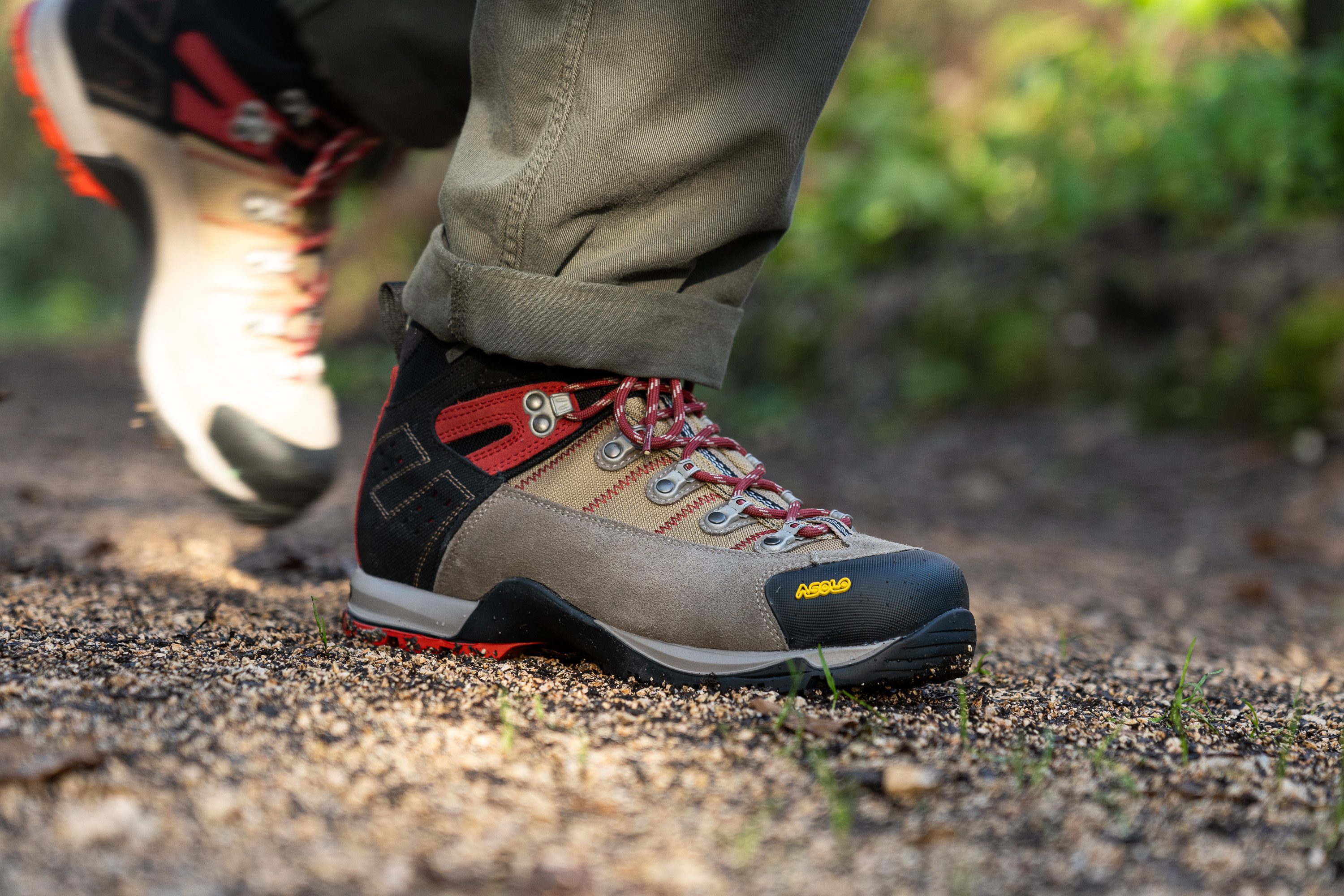
| Fugitive GTX | 22.1 mm |
| Average | 23.0 mm |
Drop
The rather dramatic difference in the Fugitive GTX’s stack heights leaves us with a staggeringly steep offset of 20 mm. This, however, doesn’t take too long to get used to, with the elevated heel providing well-cushioned landings while the lower forefoot provides a more intuitive sense of the ground below.
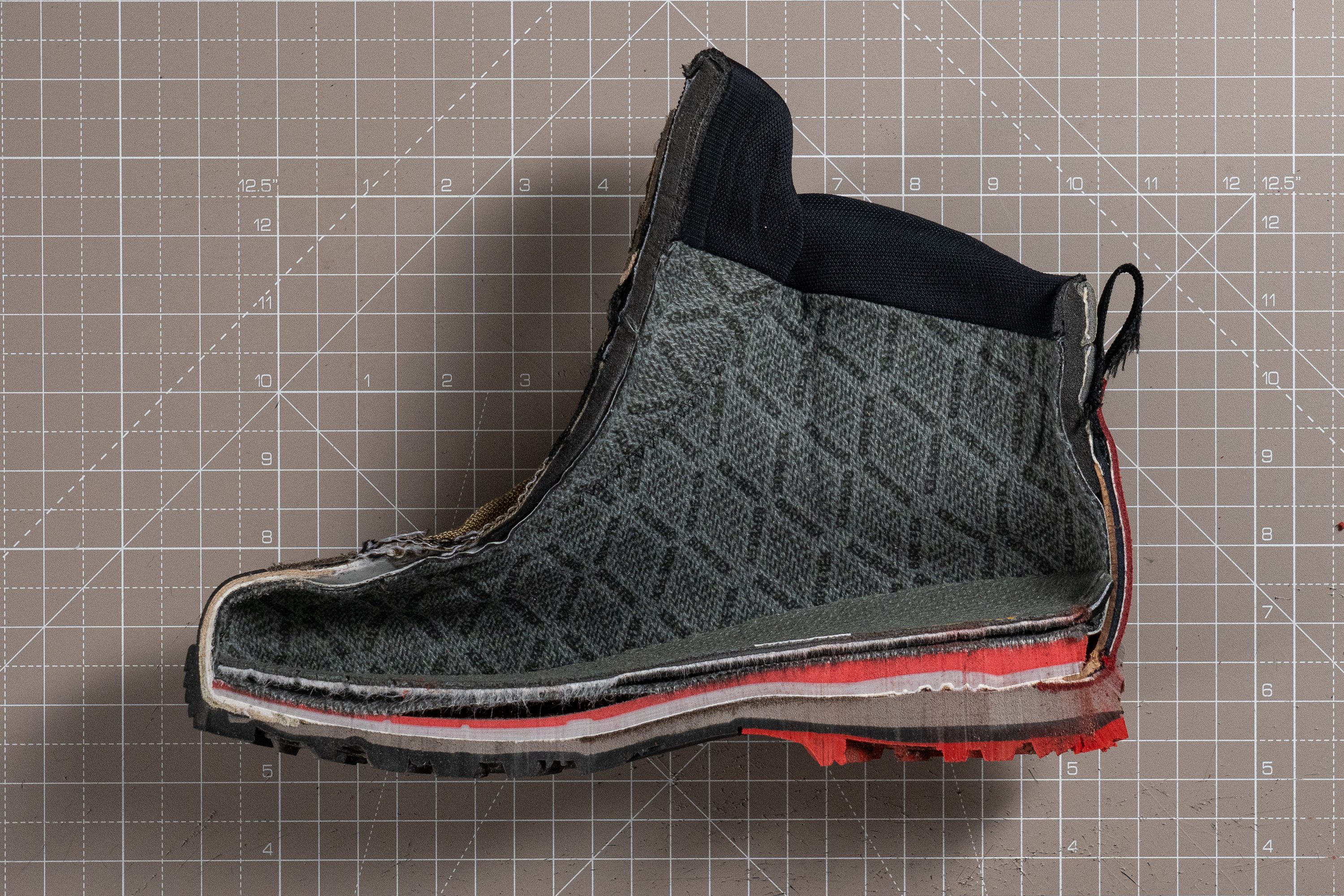
Having such a high heel drop has another advantage when it comes to backpacking. High-drop boots tend to direct more stress up to the knees and hips which puts less pressure on our ankles and Achilles tendons when carrying heavy loads over long distances.
Conversely, hikers with knee or hip issues should look into the Altra Lone Peak Hiker 2 as a comfy zero-drop alternative.
| Fugitive GTX | 20.0 mm |
| Average | 13.3 mm |
Midsole softness
Pressing our durometer against the Fugitive GTX's PU midsole foam yields a rather firm reading of 33.5 HA.
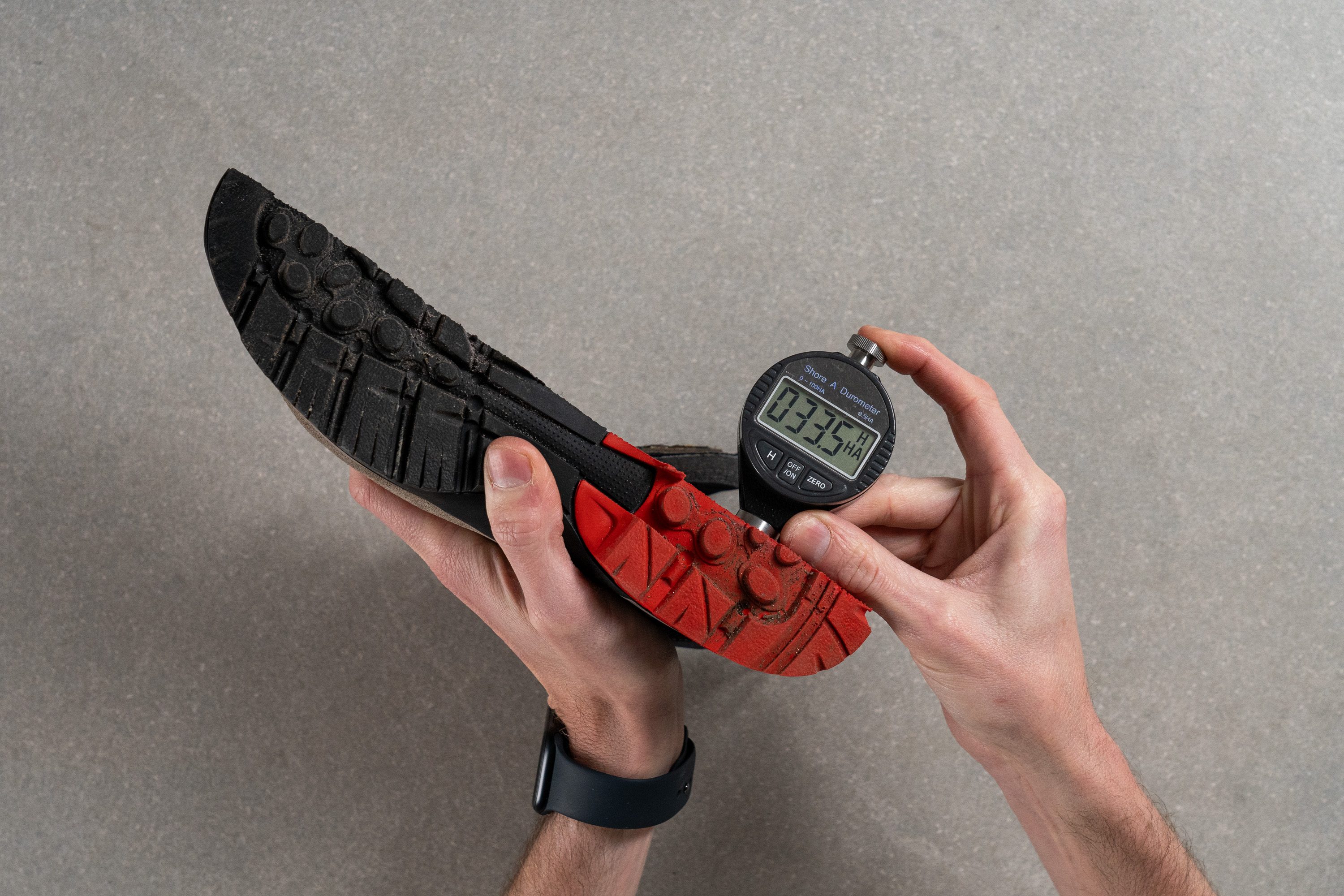
It makes the Fugitive GTX a great option for backpacking adventures as it feels incredibly stable even when laden with a heavy pack.
| Fugitive GTX | 33.5 HA |
| Average | 28.4 HA |
Secondary foam
The boot's firm underfoot feel is further enhanced by a dual-density Duo Asoflex layer (between the insole and the rubber-PU sole).
Our durometer recorded an ultra-hard reading of 96.0 HA in its bottom (white) layer and a regular firm reading of 30.0 HA in its upper (red) layer.
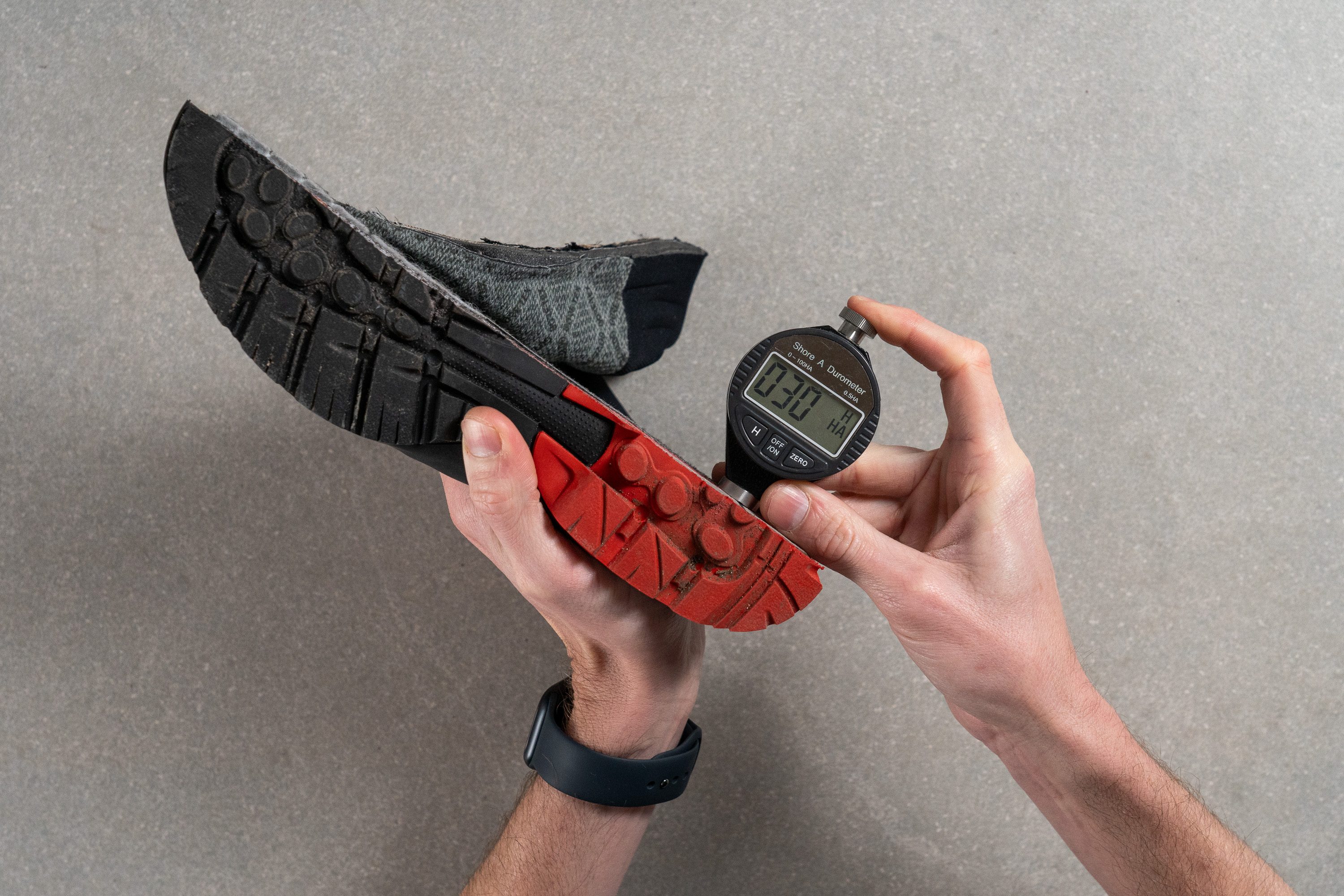
This combination helps to support and stabilize the foot arch and prevent it from collapsing as the wearer covers long distances with a heavy load.
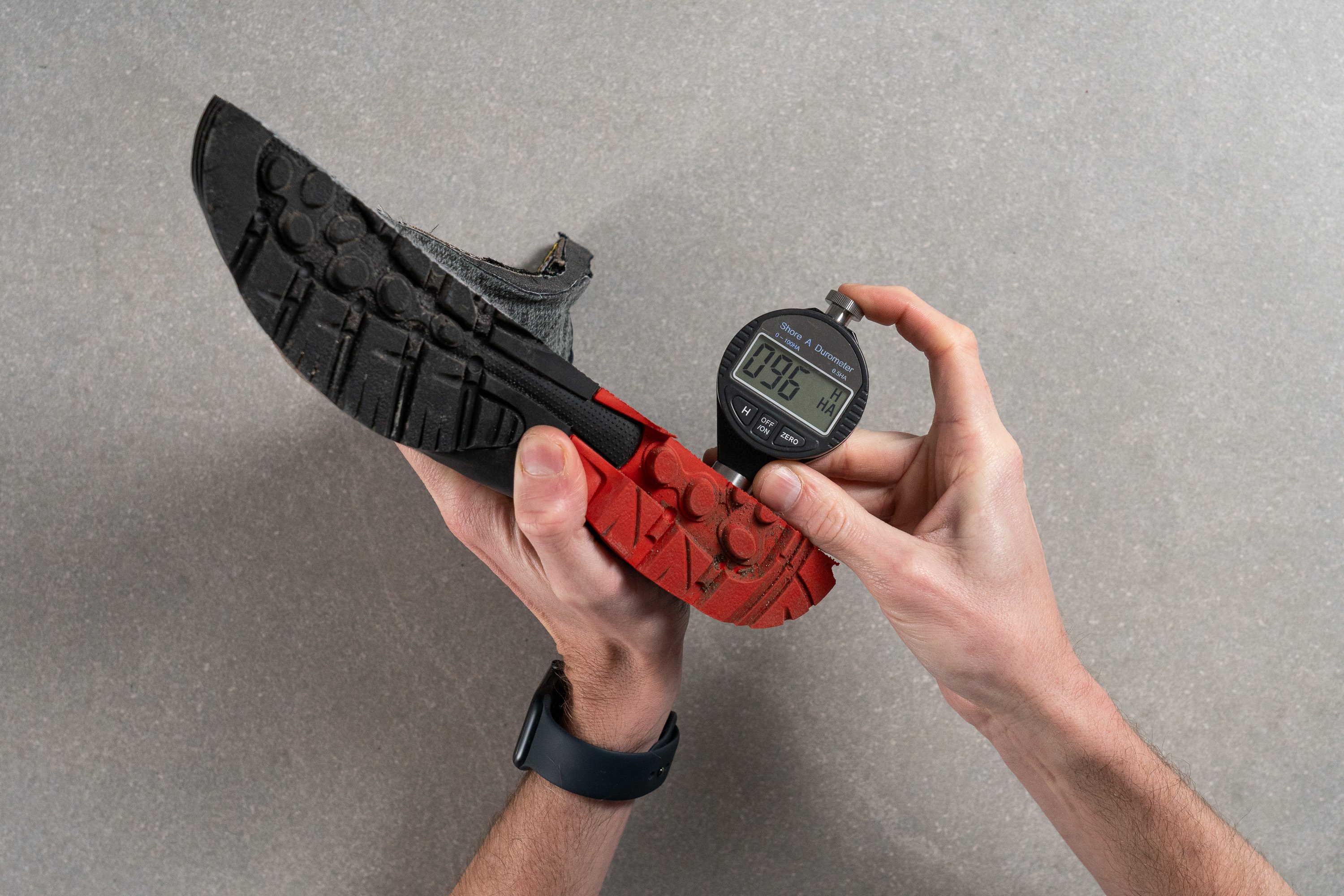
| Fugitive GTX | 96.0 HA |
| Average | 42.7 HA |
Size and fit
Size
Asolo Fugitive GTX fits true to size (185 votes).
Internal length
| Fugitive GTX | 271.4 mm |
| Average | 271.4 mm |
Width / Fit
To avoid personal bias when judging the fit of hiking boots in person, we came up with a more scientific way to check its internal dimensions - by making a 1:1 gel mold!
Once the Fugitive GTX's gel was solid, we used a caliper to measure the widest part. The boot returned a slightly narrower than average reading of 91.9 mm in this area but it still felt comfy and secure on our medium-width feet. However, folks with broader feet would benefit from the boot's wide version.
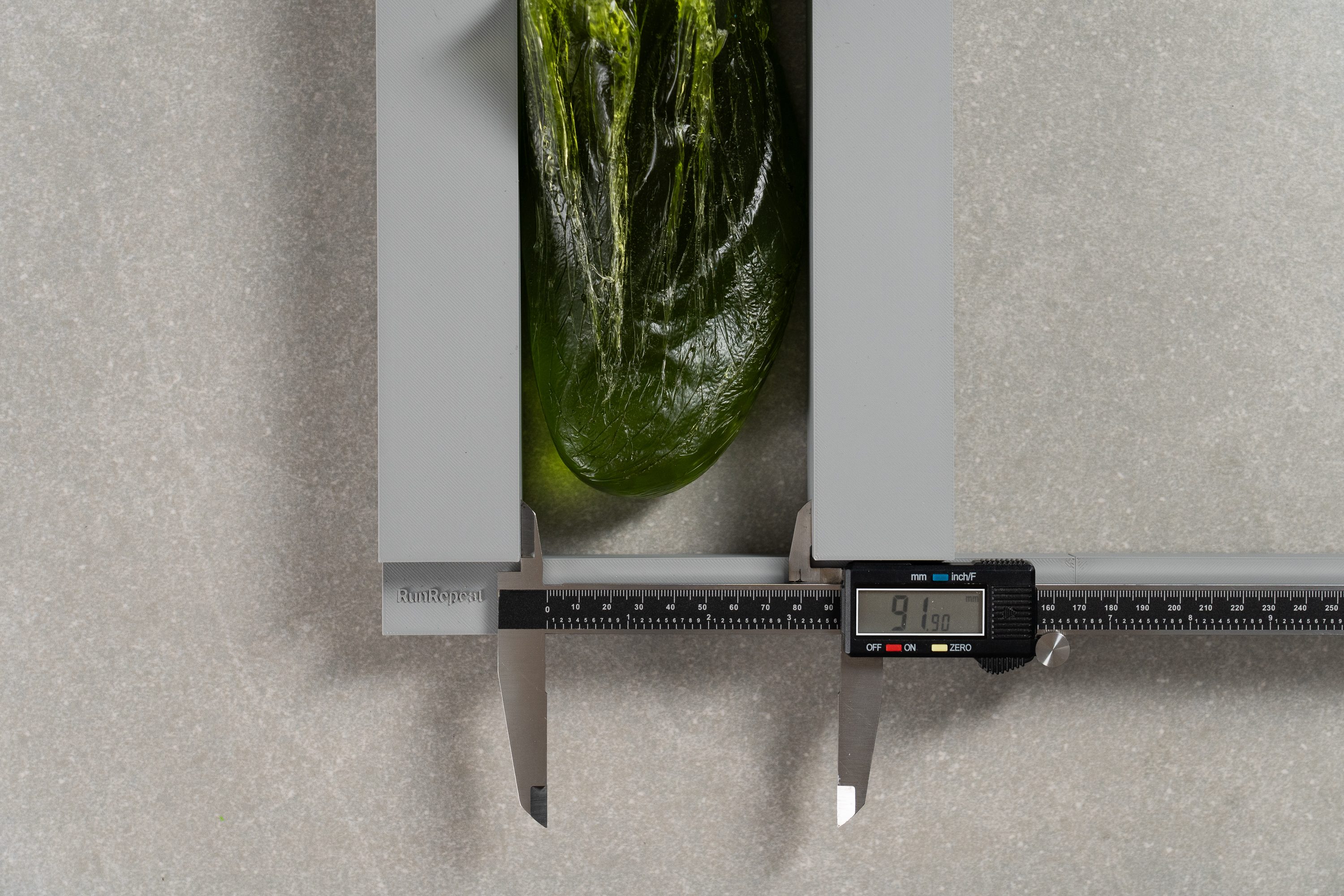
| Fugitive GTX | 91.9 mm |
| Average | 93.8 mm |
Toebox width
This Asolo boot gets even snugger towards the toes becoming as narrow as 66.9 mm near the big toe! This is almost 5 mm less than the average which is why the toebox creates a very close-fitting experience even for our average feet.
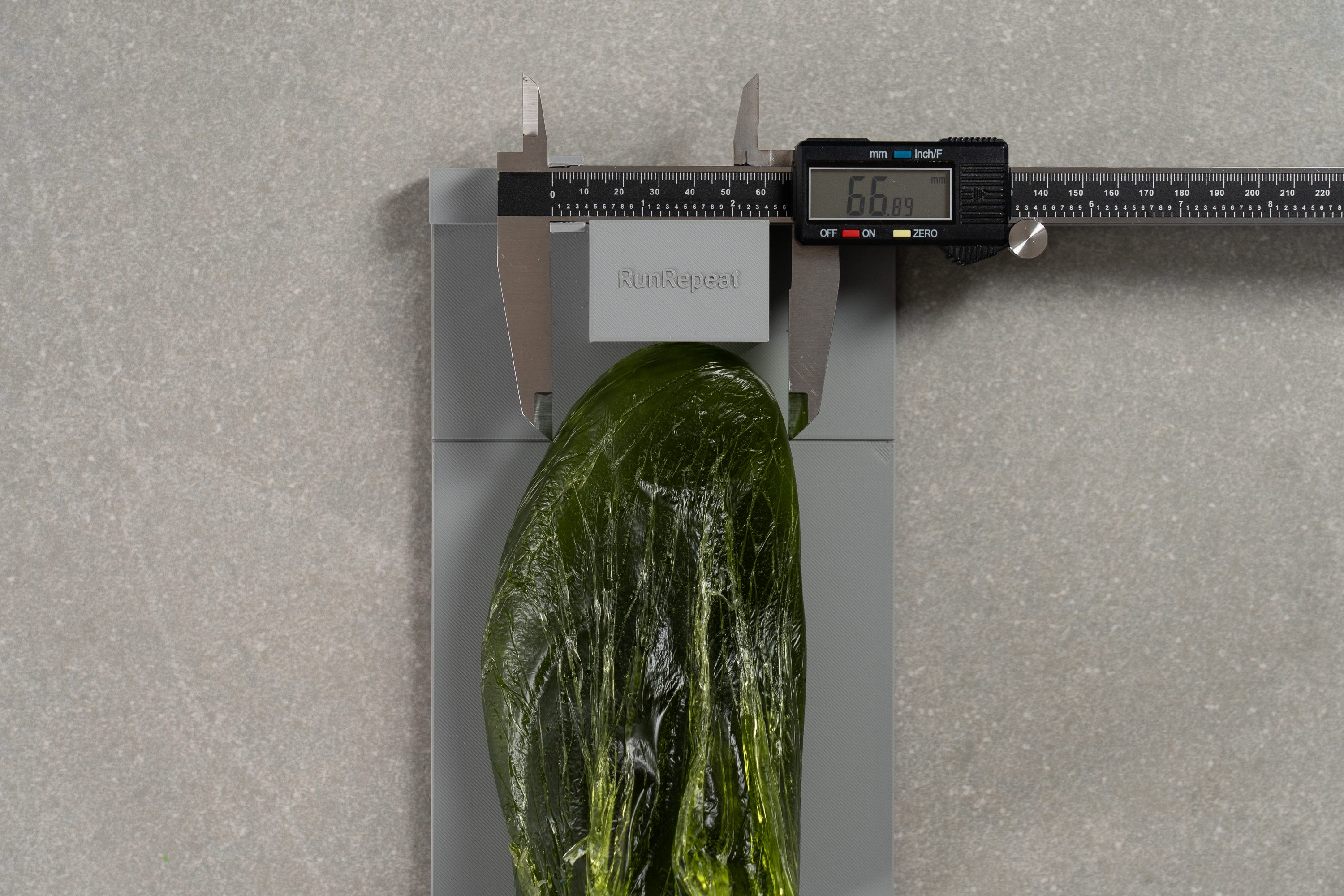
Having a one-to-one fit like that is very helpful for traversing technical terrain where precise foot placement is key but it can interfere with your long-term comfort.
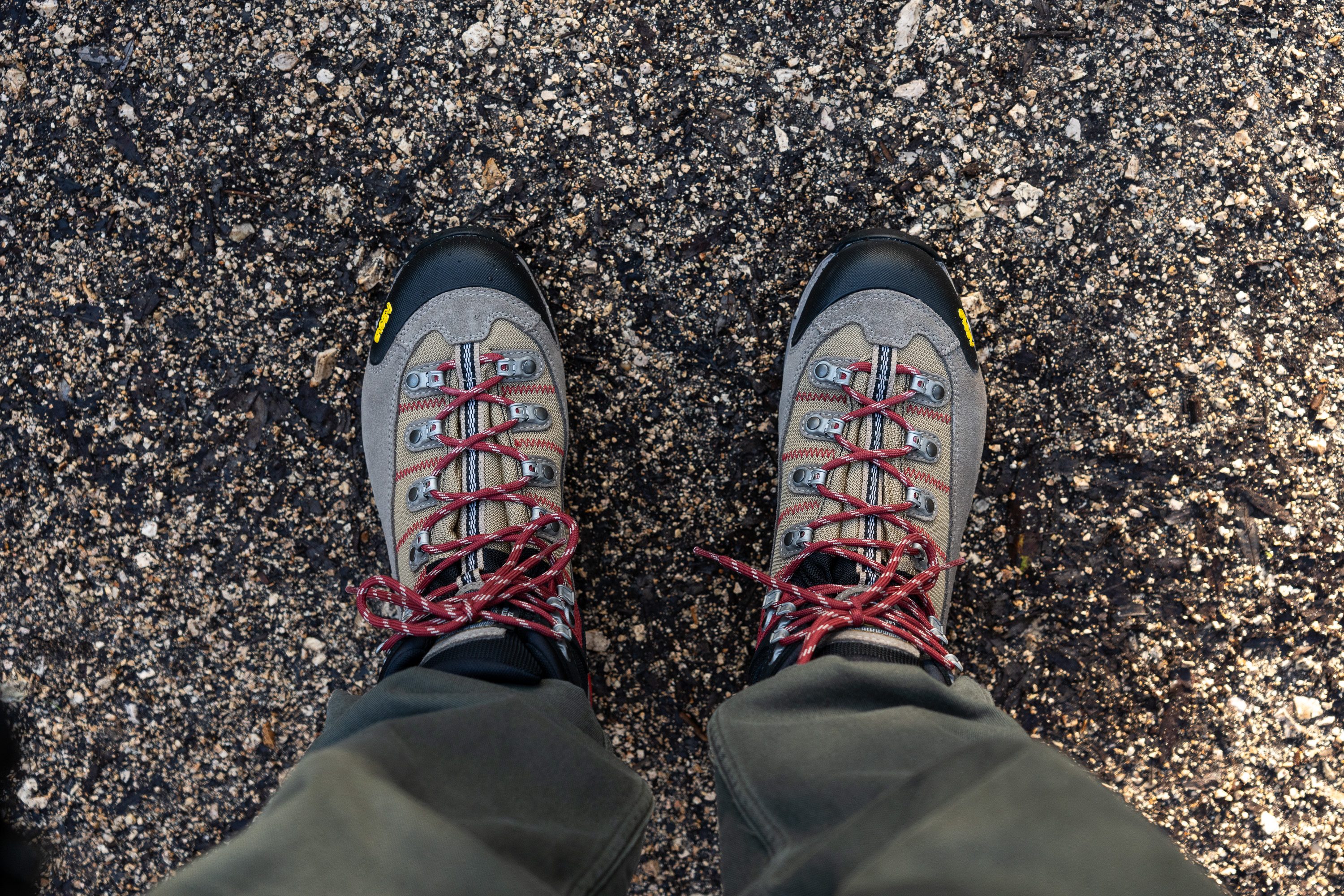
| Fugitive GTX | 66.9 mm |
| Average | 71.2 mm |
Toebox height
At least the boot's vertical space offers some breathing room with its above-average toebox height of 28.7 mm.
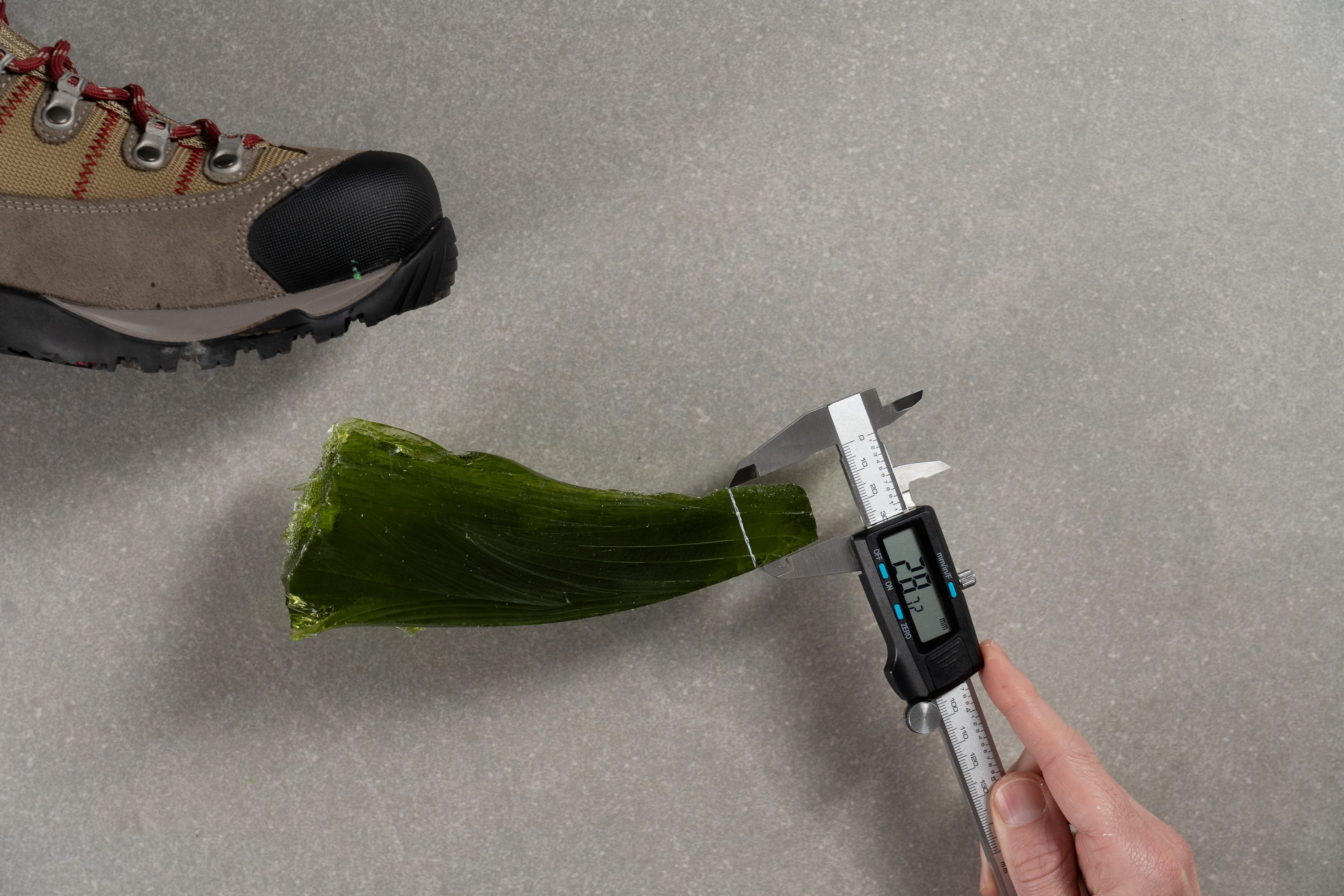
| Fugitive GTX | 28.7 mm |
| Average | 27.4 mm |
Traction / Grip
Lug depth
Using our caliper, we measured the Fugitive GTX’s lugs to be 3.6 mm thick.
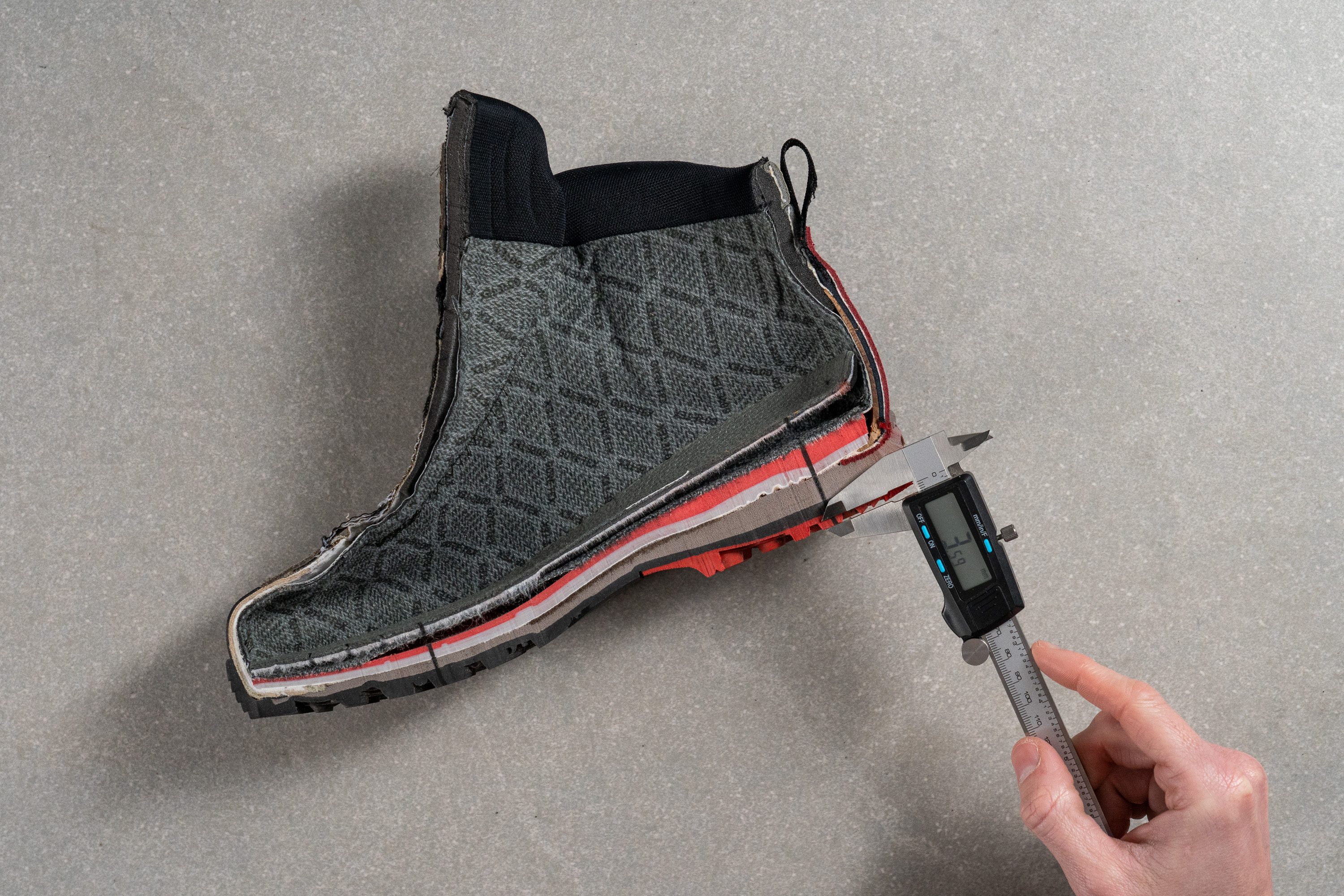
This isn’t quite as thick as our current lab average, however, their varied shapes and grooves form a tread pattern that provided us with excellent traction, even upon encountering muddy climbs or descents.
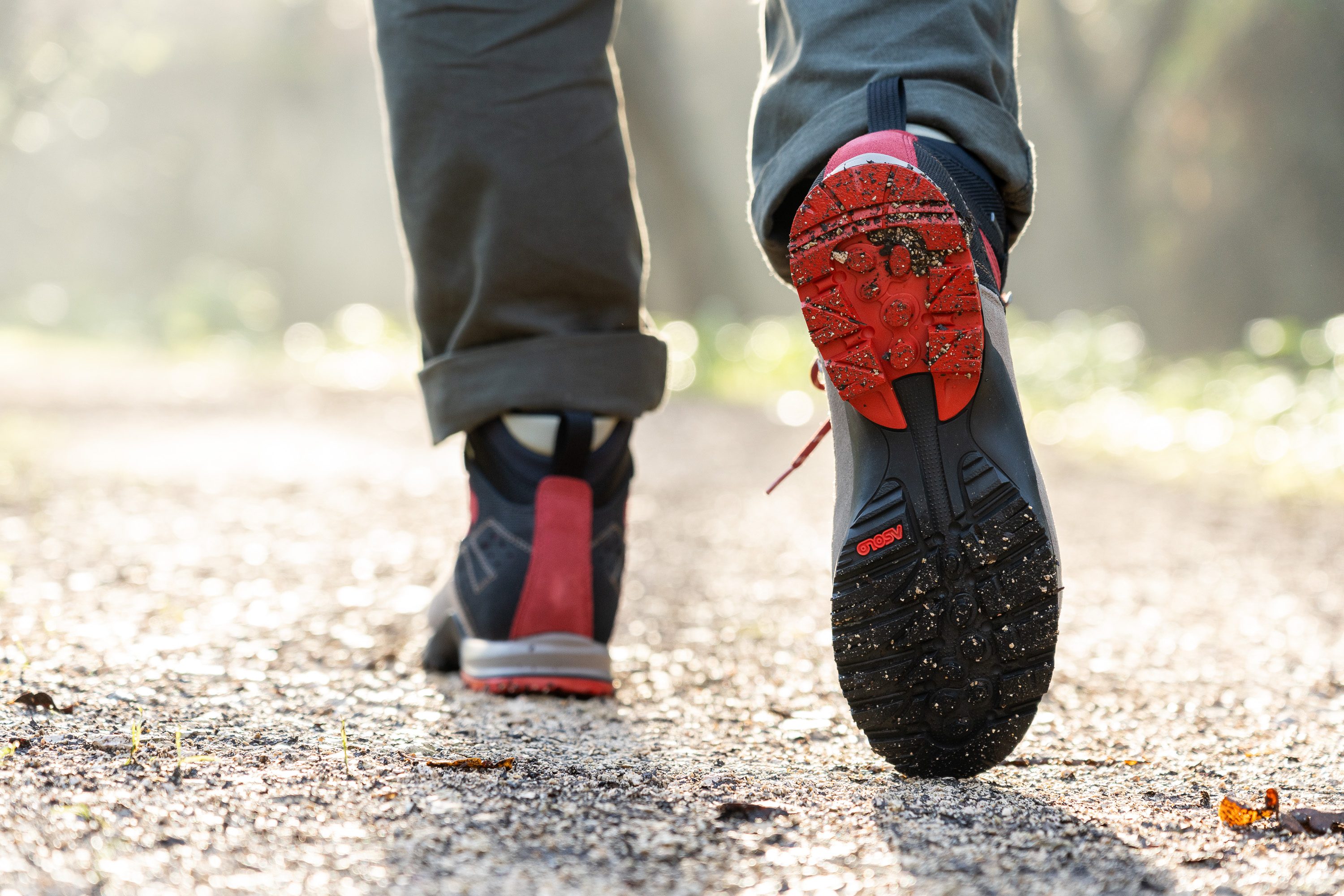
| Fugitive GTX | 3.6 mm |
| Average | 4.3 mm |
Flexibility / Stiffness
As touched upon earlier, with all that rubber and foam underfoot, not to mention the lasting board, it should come as no surprise that the Fugitive GTX is a rather stiff boot.
Measuring the amount of force it takes to bend it by 30 degrees returned a very high reading of 37.5N. That is notably more force than it takes to flex an average hiking boot.
But if you are serious about backpacking, this is a very welcome kind of stiffness. The Fugitive GTX prevented our feet from bending over every rock and tree root in our path when tackling uneven and rocky terrain. Avoiding excessive foot flexion like that helped to delay the onset of foot fatigue while also keeping us feeling surefooted and stable with every stride.
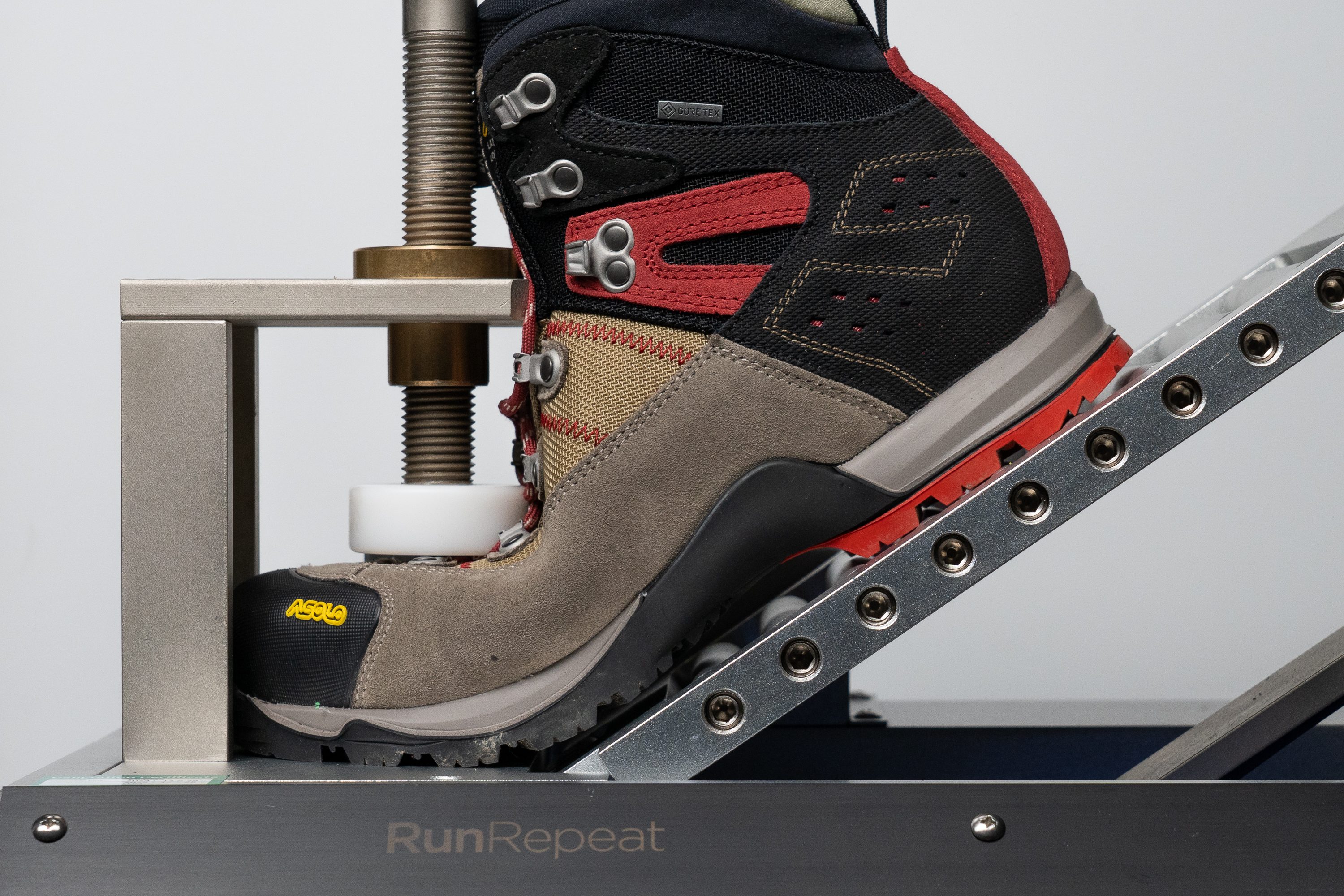
| Fugitive GTX | 37.5N |
| Average | 31.5N |
Weight
This brings us to the weigh-in and the Fugitive GTX most certainly belongs in the heavyweight division at a chunky (704g).
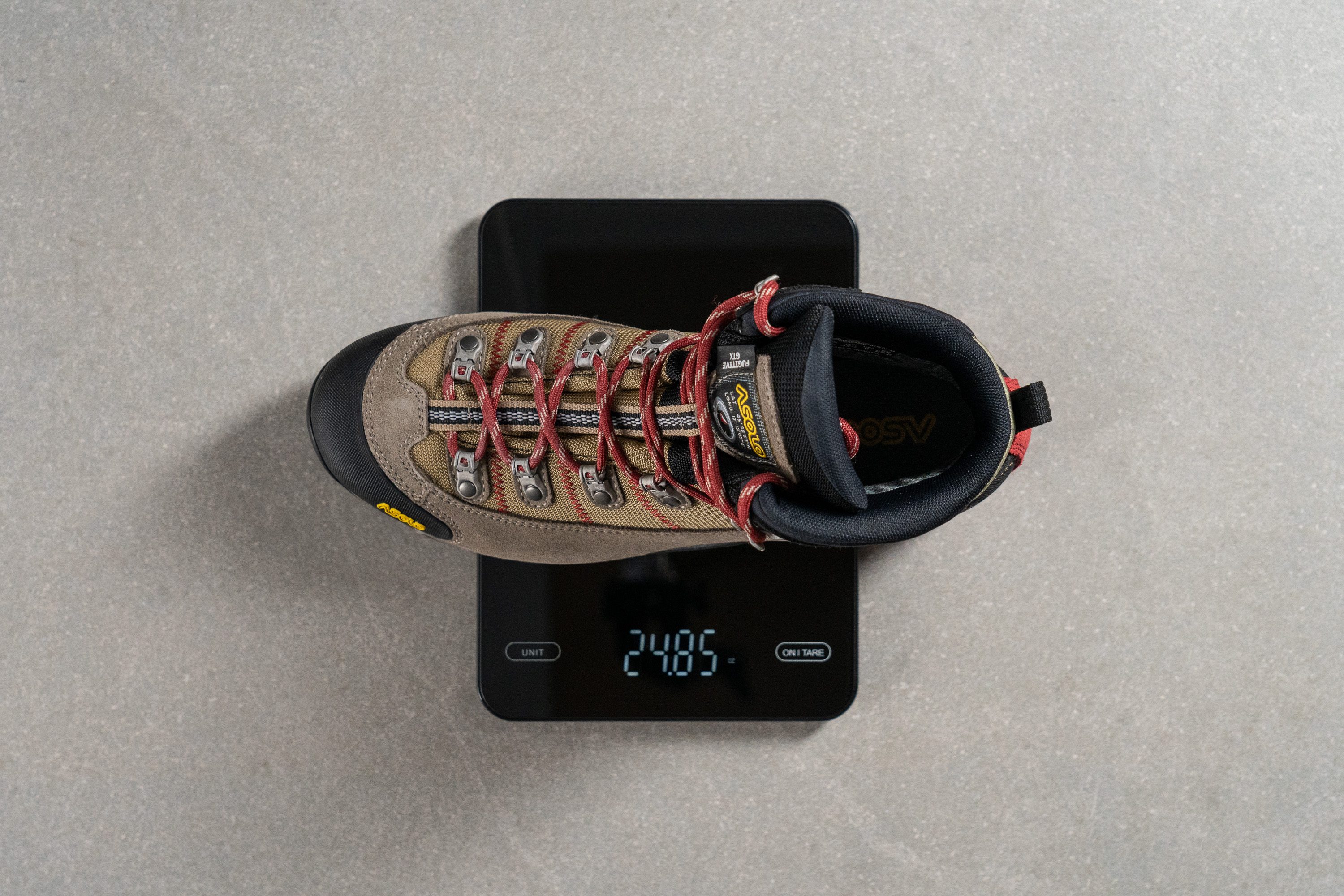
This will take some getting used to for anyone coming from a more lightweight hiking boot like the aforementioned Hoka Anacapa Mid GTX. However, it does pay off when carrying a heavy pack over long distances where having all that heft underfoot gives us added confidence with every stride as we thud our way along the trails.
| Fugitive GTX | 24.8 oz (704g) |
| Average | 18.7 oz (531g) |
Breathability
Waterproof shoes tend not to do very well in our smoke test, and the Fugitive GTX is no exception. As we can see from the footage, smoke is unable to escape through any part of the boot, leading us to give the Fugitive GTX the lowest breathability score of 1 out of 5. This means that it will certainly feel toasty during warmer hikes, not to mention the increased risk of becoming stinky over time.
The insular nature of the Fugitive GTX is further illuminated when inspecting a backlit cross-section of the boot. The upper entirely eclipses the light, further demonstrating just how impermeable the upper really is. As such, we didn’t have any issues with water penetrating the boot when crossing streams or sloshing through puddles. Conversely though, if water does get into the boot, it’s staying there until taking them off and giving them a good shake.
Looking at it under our microscope, we can see that even the mesh portion of the upper is woven so compactly and uniformly with no gaps for airflow or water penetration to be found between the braided fibers.
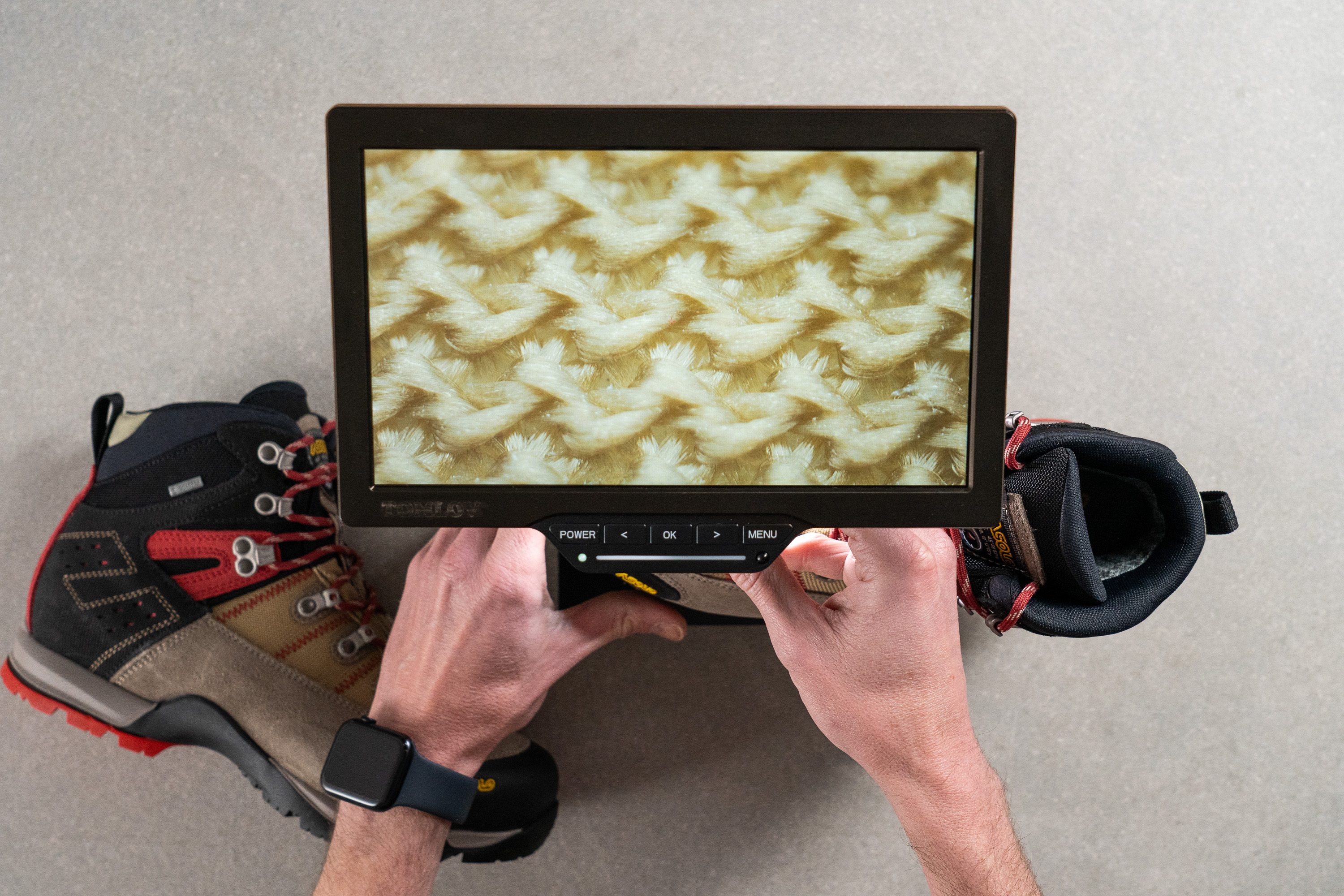
| Fugitive GTX | 1 |
| Average | 1.3 |
Stability
Lateral stability test
Despite the boot’s massive heel stack, the Fugitive GTX feels extremely well-planted when shifting our weight from side to side. This level of stability means that we were able to scamper along the trials while toting a heavy pack confident that we weren't going to roll an ankle, even when traversing uneven terrain.
We’ll explore how this is possible with our next series of tests.
Torsional rigidity
To assess the Fugitive GTX’s torsional rigidity, we attempted to bend and twist the boot in our hands but were barely able to get it to budge! We therefore have no choice but to give it the stiffest score of 5 out of 5 on our subjective scale. This no doubt comes as a result of the considerable amount of rubber and foam that makes up the boot’s sizeable stack, as well as the Duo Asoflex lasting board that promotes comfort and stability.
In practical terms, this means that we had a nice and level base that ensured stable landings while we tested this boot.
| Fugitive GTX | 5 |
| Average | 4.4 |
Heel counter stiffness
The heel counter is similarly sturdy and greatly resisted our manual manipulations, earning the Fugitive GTX another maximum stiffness score of 5 out of 5.
As such, the boot does a good job of locking our rearfoot in place while also mitigating any excessive rolling of the foot which also enhances our sense of stability during our stride.
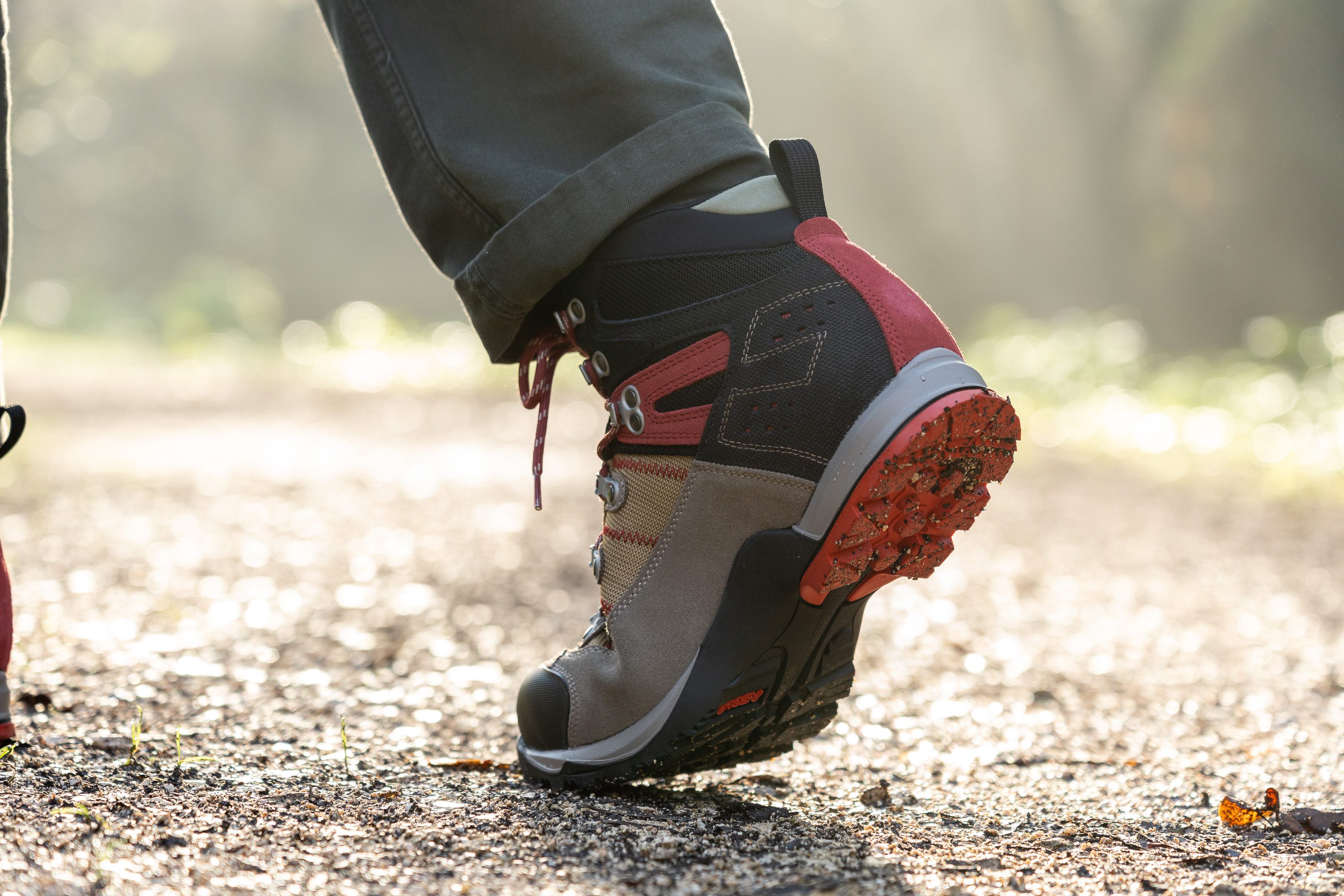
| Fugitive GTX | 5 |
| Average | 3.6 |
Midsole width - forefoot
We measured the midsole to be 107.4 mm wide at the forefoot which is quite a bit narrower than our current lab average. Though with the stack being relatively low to the ground in this part of the shoe, this didn’t negatively impact our stability while out testing the Fugitive GTX.
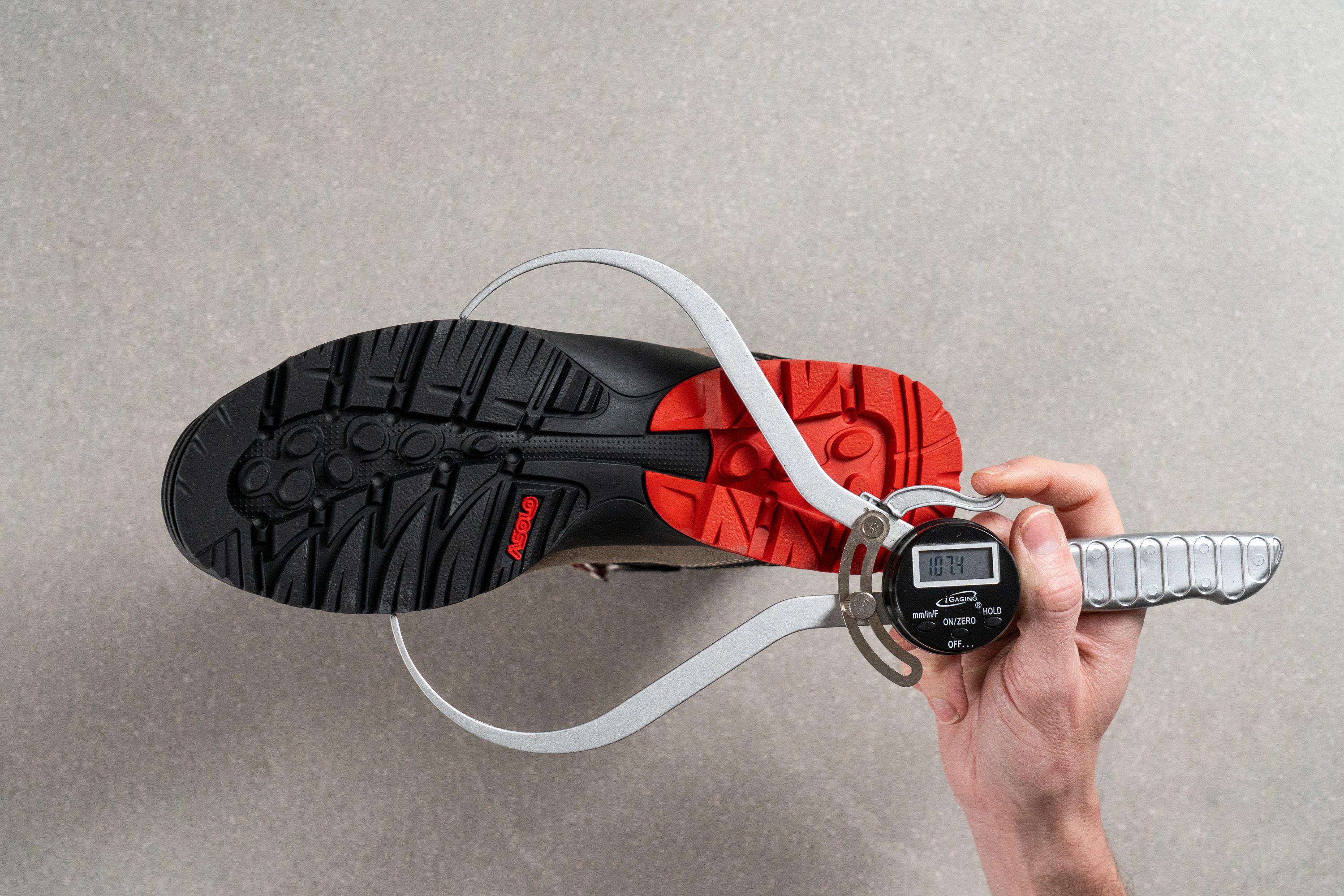
| Fugitive GTX | 107.4 mm |
| Average | 111.5 mm |
Midsole width - heel
Back at the heel, we found the Fugitive GTX’s midsole to only be 76.8 mm wide which is significantly narrower than average.
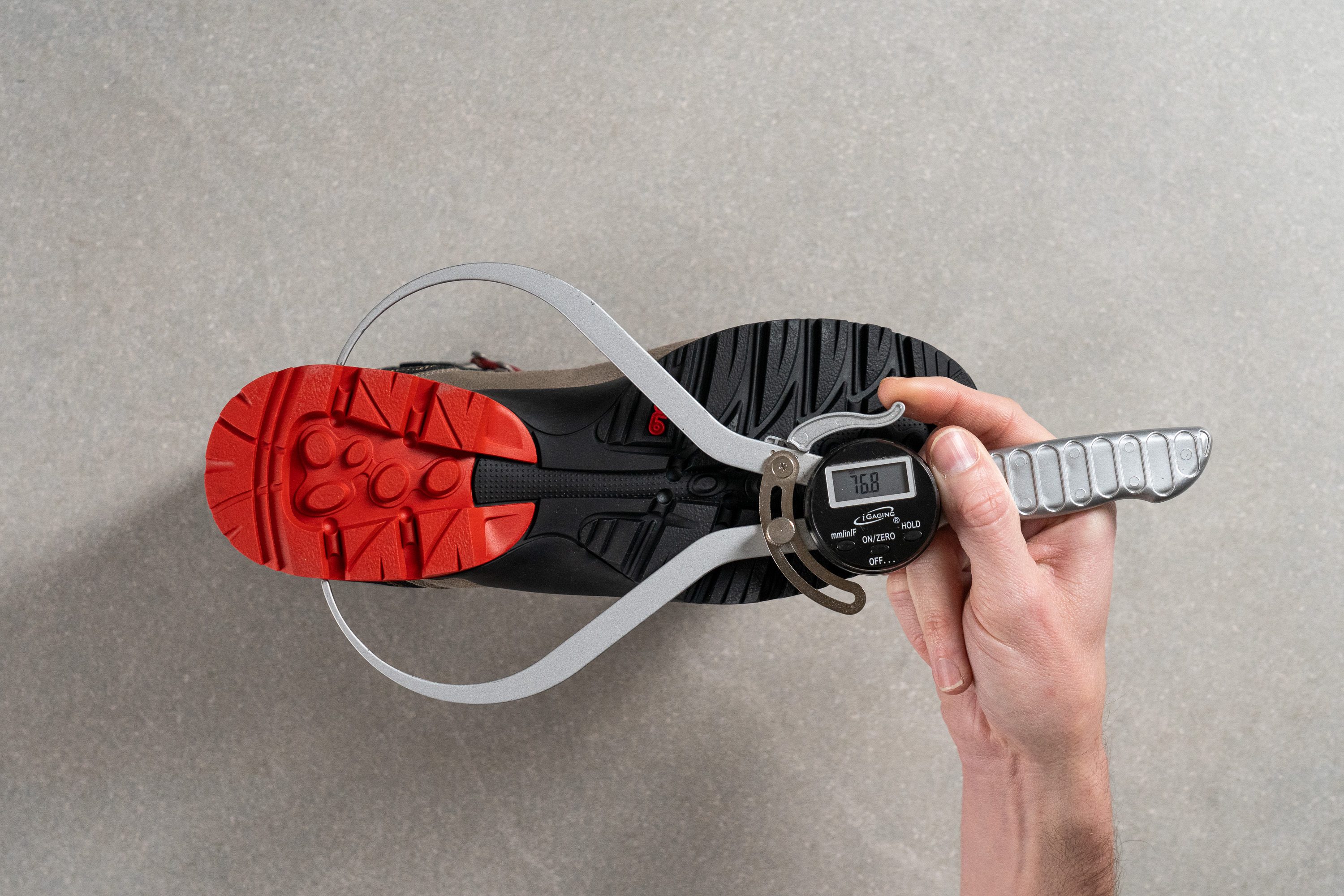
This would ordinarily be a cause for concern when found in conjunction with a high heel, though we found that the boot’s other stability features do a good job offsetting any potential imbalance.
However, those more accustomed to boots with a wider platform at the heel for added stability should consider the Hoka Kaha 2 GTX as an alternative.
| Fugitive GTX | 76.8 mm |
| Average | 87.6 mm |
Durability
Toebox durability
First up to face our Dremel in our battery of durability tests is the Fugitive GTX’s toebox. Spinning at 5K RPM, we set the tool’s abrasive element between the boot’s rubberized toe bumper and its suede upper with 3.2N of force.
While this initially seems quite destructive, the damage left in the wake of the twelve-second test isn’t nearly as dramatic. As we can clearly see, the Fugitive GTX escaped with a mere scuff that didn’t even seem to affect the stitching around the suede. This stellar performance leads us to give the Fugitive GTX a perfect 5 out of 5 for toebox durability.
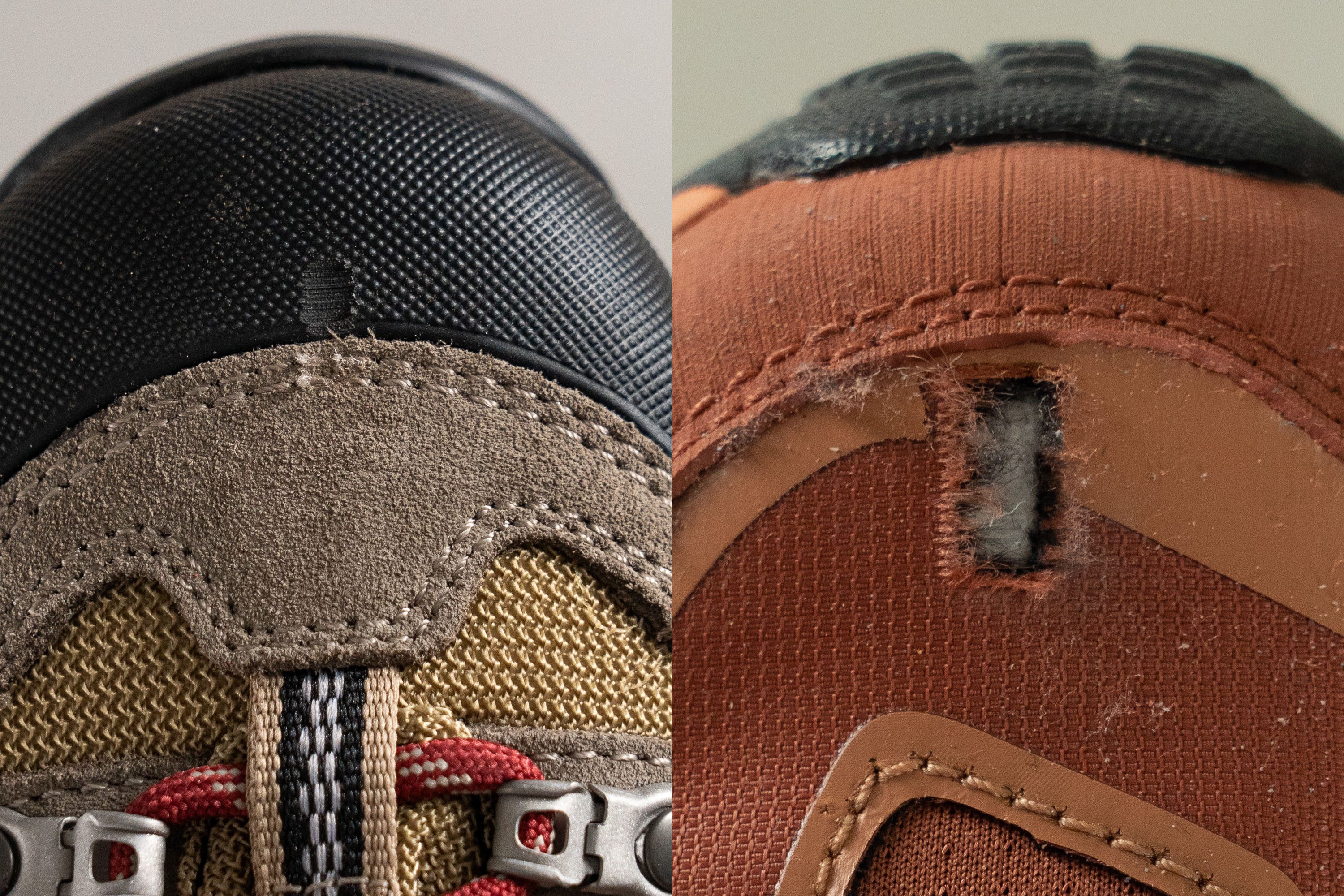
We therefore don’t expect a catastrophic failure of the toebox to bring an early retirement to this boot, even for those regularly traversing harsher paths or blazing untamed trails. However, as a bit of spooky foreshadowing, there is a caveat to that last statement coming soon.
| Fugitive GTX | 5 |
| Average | 4.3 |
Heel padding durability
The Fugitive GTX’s heel counter also proved to be a worthy contender against our Dremel which was unable to do much except mangle the lining material a bit for four seconds.
As demonstrated by our aftermath photo, the Fugitive GTX was merely left with an unsightly scuff while most of the padding material remained relatively intact within. This above-average performance leads us to give the Fugitive GTX a heel padding durability score of 4 out of 5.
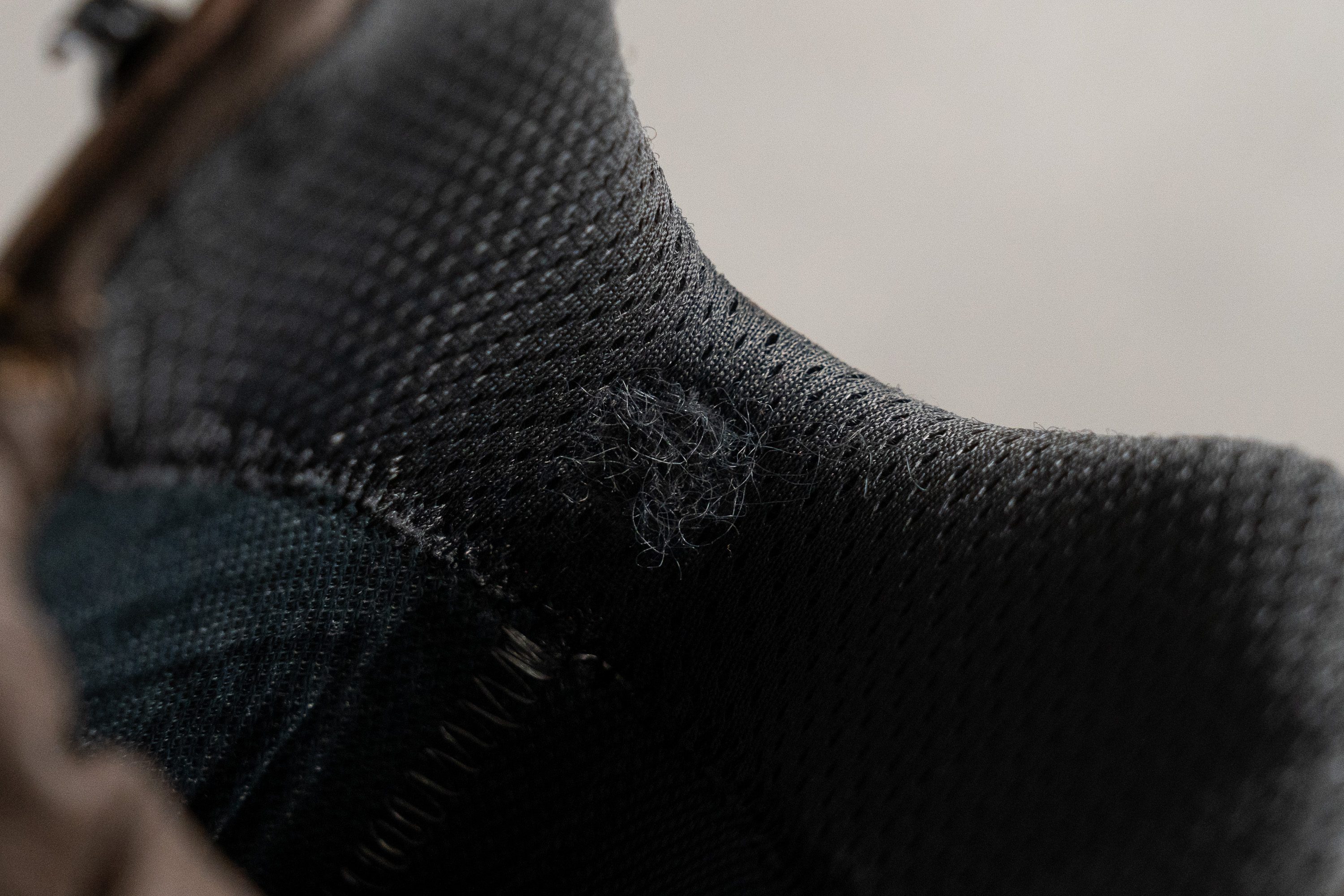
| Fugitive GTX | 4 |
| Average | 3.6 |
Outsole hardness
We pressed our durometer against the Fugitive GTX’s outsole and got a slightly harder-than-average reading of 89 HC. This explains the outsole’s performance in our Dremel test but, as previously mentioned, that doesn’t really factor into its lackluster durability as much as the dodgy glue-job.
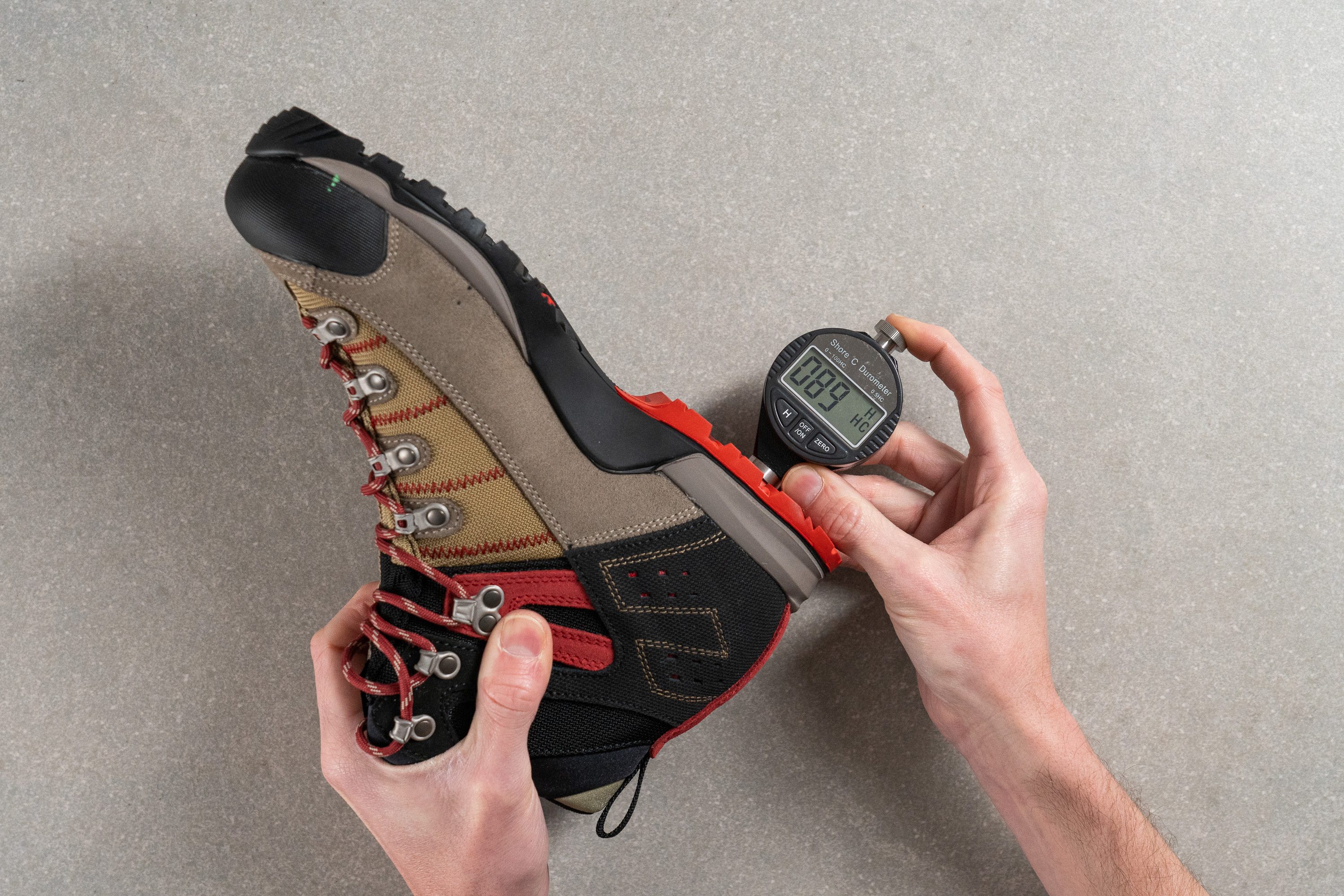
| Fugitive GTX | 89.0 HC |
| Average | 87.1 HC |
Outsole durability
For the Dremel’s final outing in our battery of durability tests, we fired up the abrasive element to a more formidable 10K RPM and set it against the Fugitive GTX’s outsole.
Despite some rather large chunks coming loose by the end of the twenty-two-second test, we determined (using our handy tire tread gauge) that the Fugitive GTX lost only 0.7 of rubber in this demonstration of extreme wear and tear which is slightly less than average.
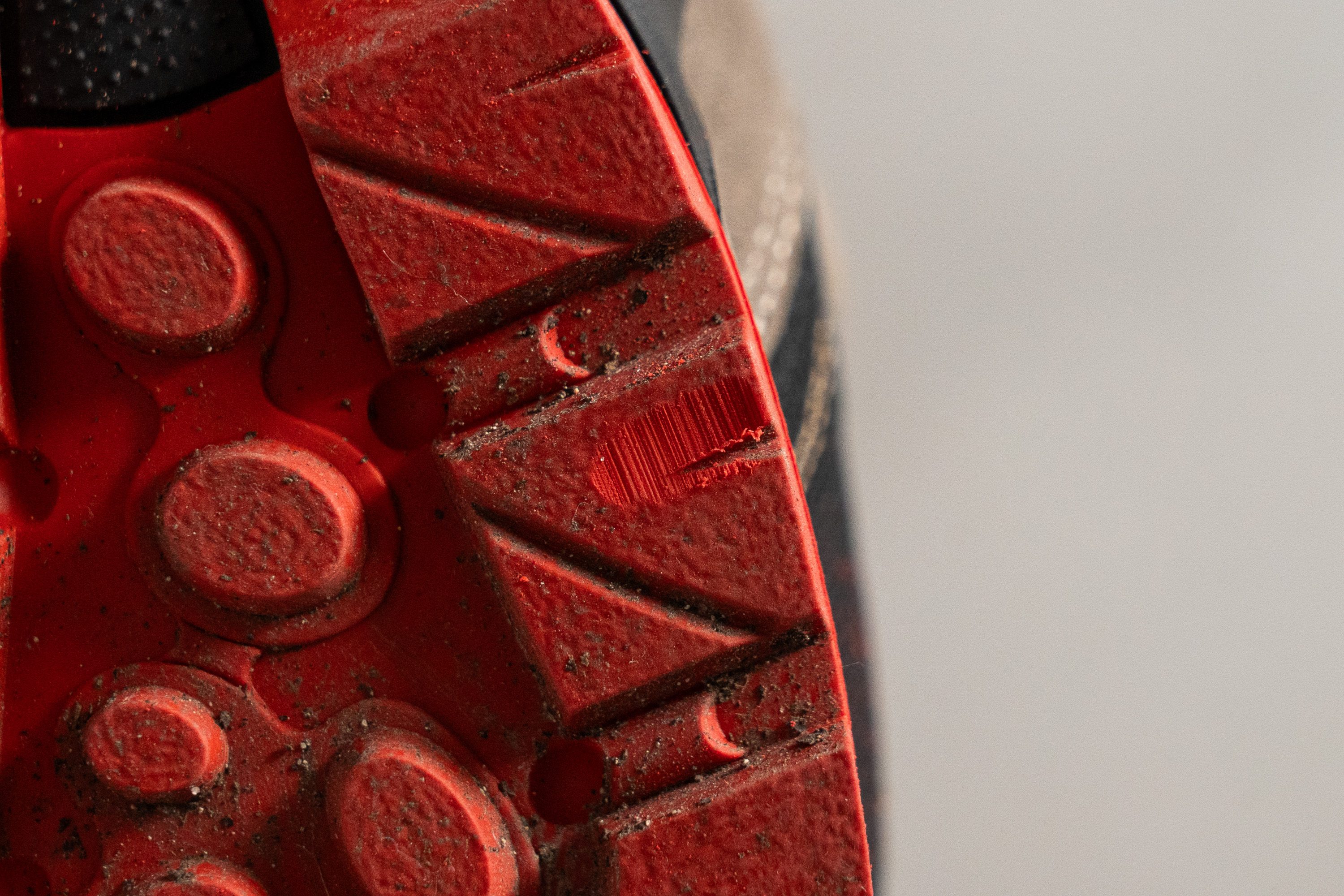
While the outsole rubber is quite hardy, the Fugitive GTX’s somewhat shoddy construction lets the boot down. After only a handful of test hikes of varying difficulty, we noticed that the outsole began to unpeel from the midsole in a less-than-reassuring display of durability. So while the toebox likely won’t buckle under pressure, the same can’t be said of the Fugitive GTX’s outsole.
| Fugitive GTX | 0.7 mm |
| Average | 0.8 mm |
Outsole thickness
Using our caliper, we measured the Fugitive GTX’s outsole to be 5.6 mm thick. This is substantially more rubber than the average hiking boot boasts underfoot which, on the one hand, gives us plenty of material to wear through; given it doesn’t come unstuck of course! On the other hand, all that material does weigh the boot down quite a bit.
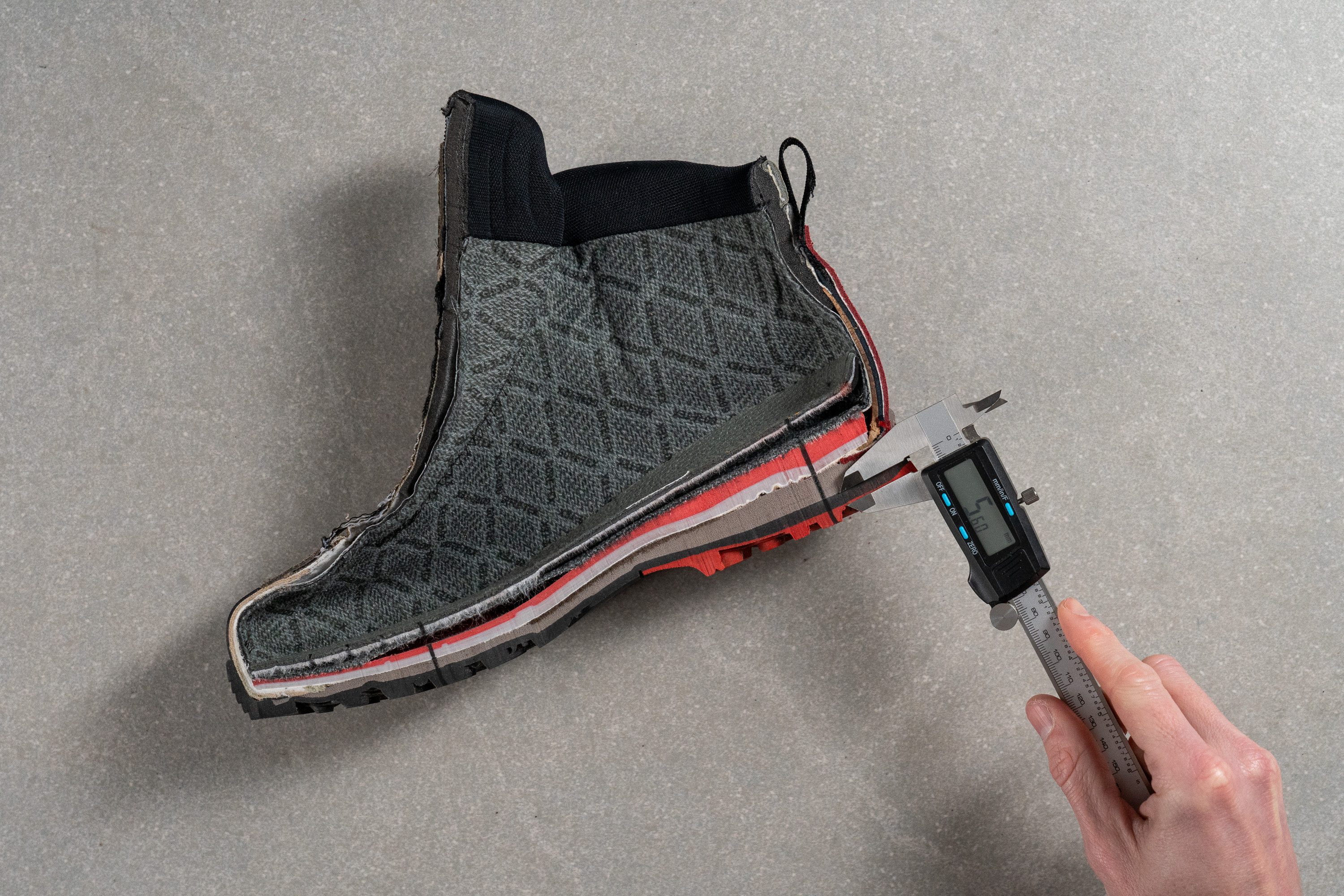
| Fugitive GTX | 5.6 mm |
| Average | 2.9 mm |
Misc
Insole thickness
The insole is only 4 mm thick according to our caliper measurements, making it slightly less padded than our current lab average.
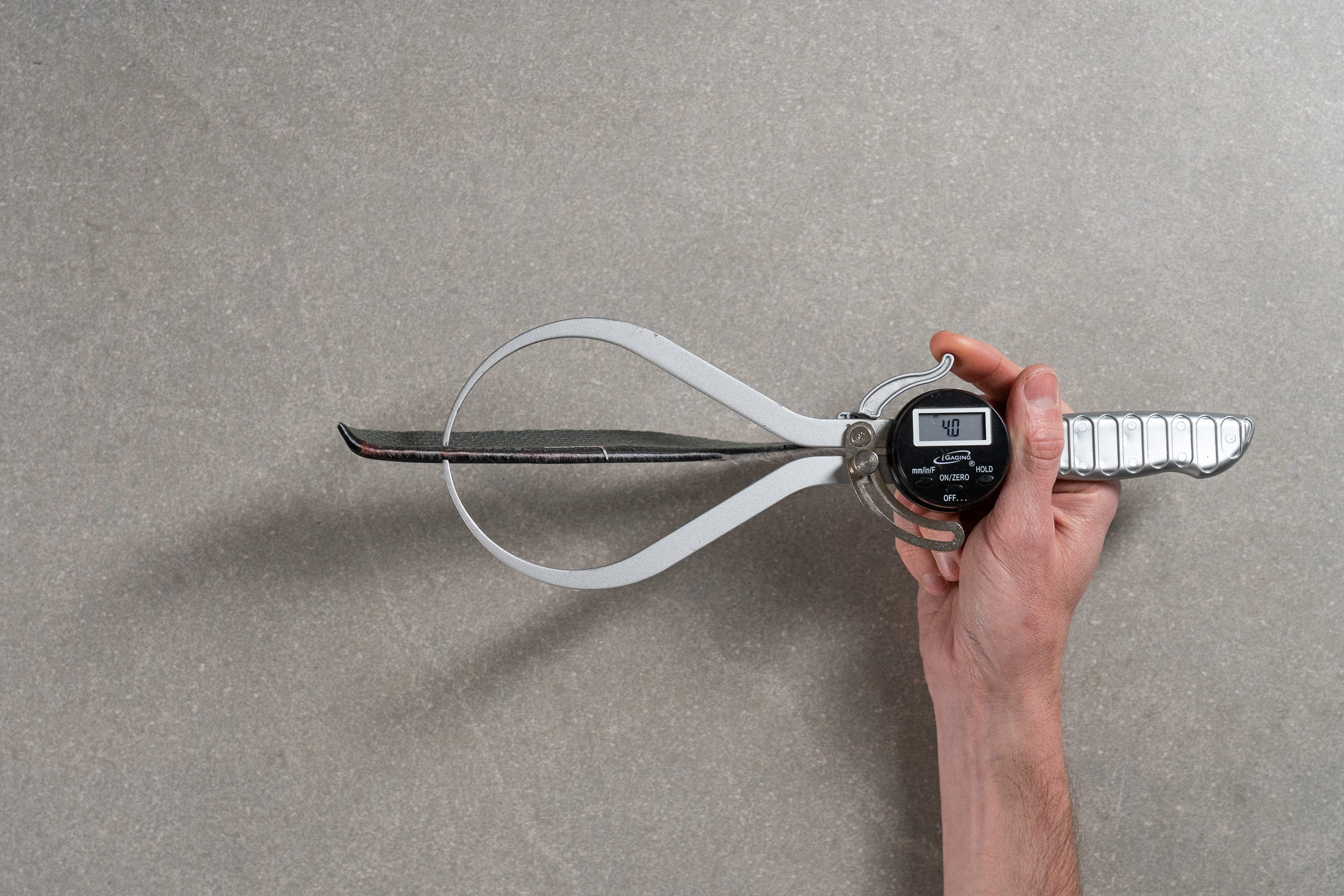
However, it sits on Asolo's proprietary Duo Asoflex lasting board which offers some added internal cushioning while still being rigid and stable.
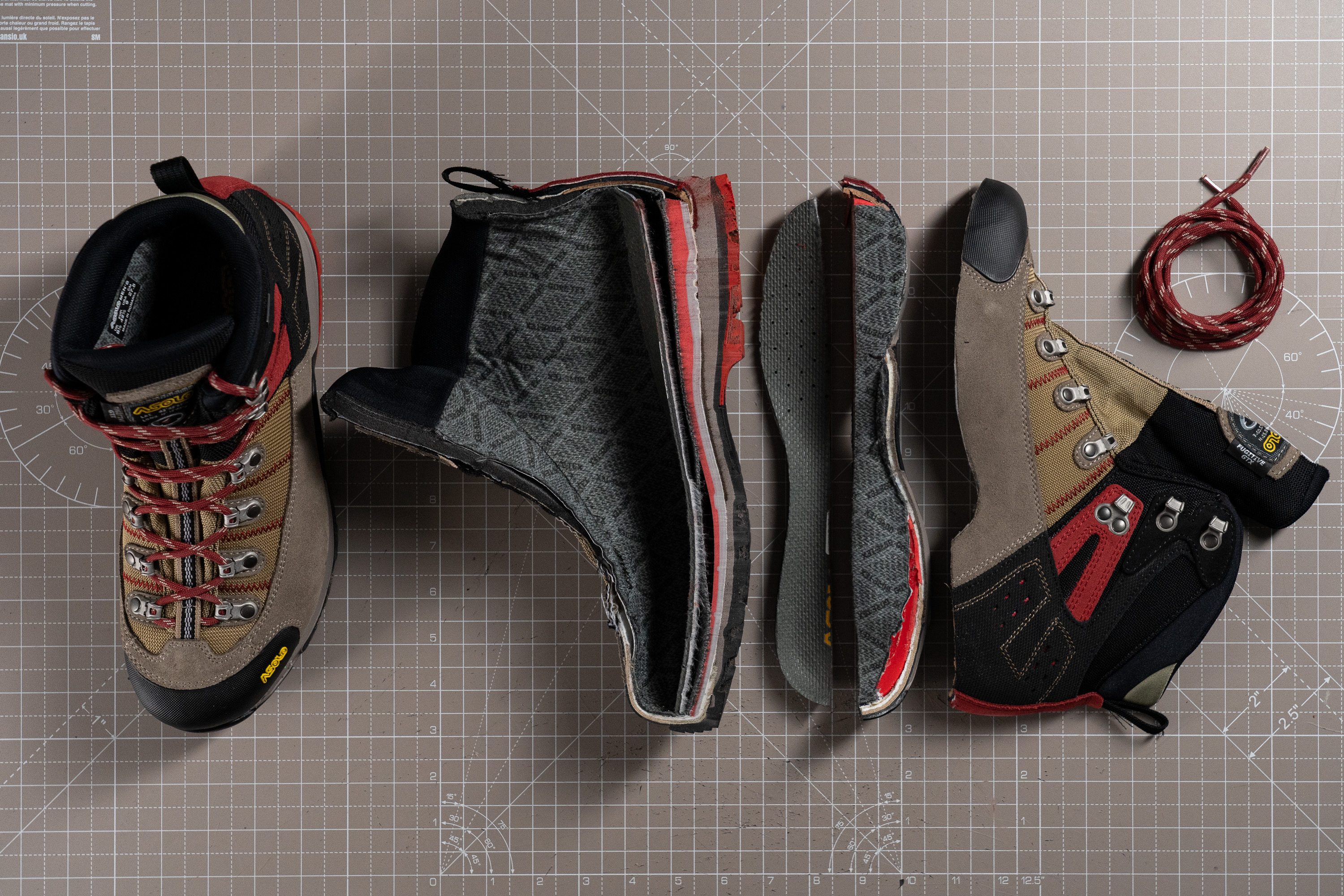
| Fugitive GTX | 4.0 mm |
| Average | 6.0 mm |
Removable insole
For those in need of more specific arch support, the Fugitive GTX’s insole isn’t glued in which makes replacing it with a custom orthotic a viable option.
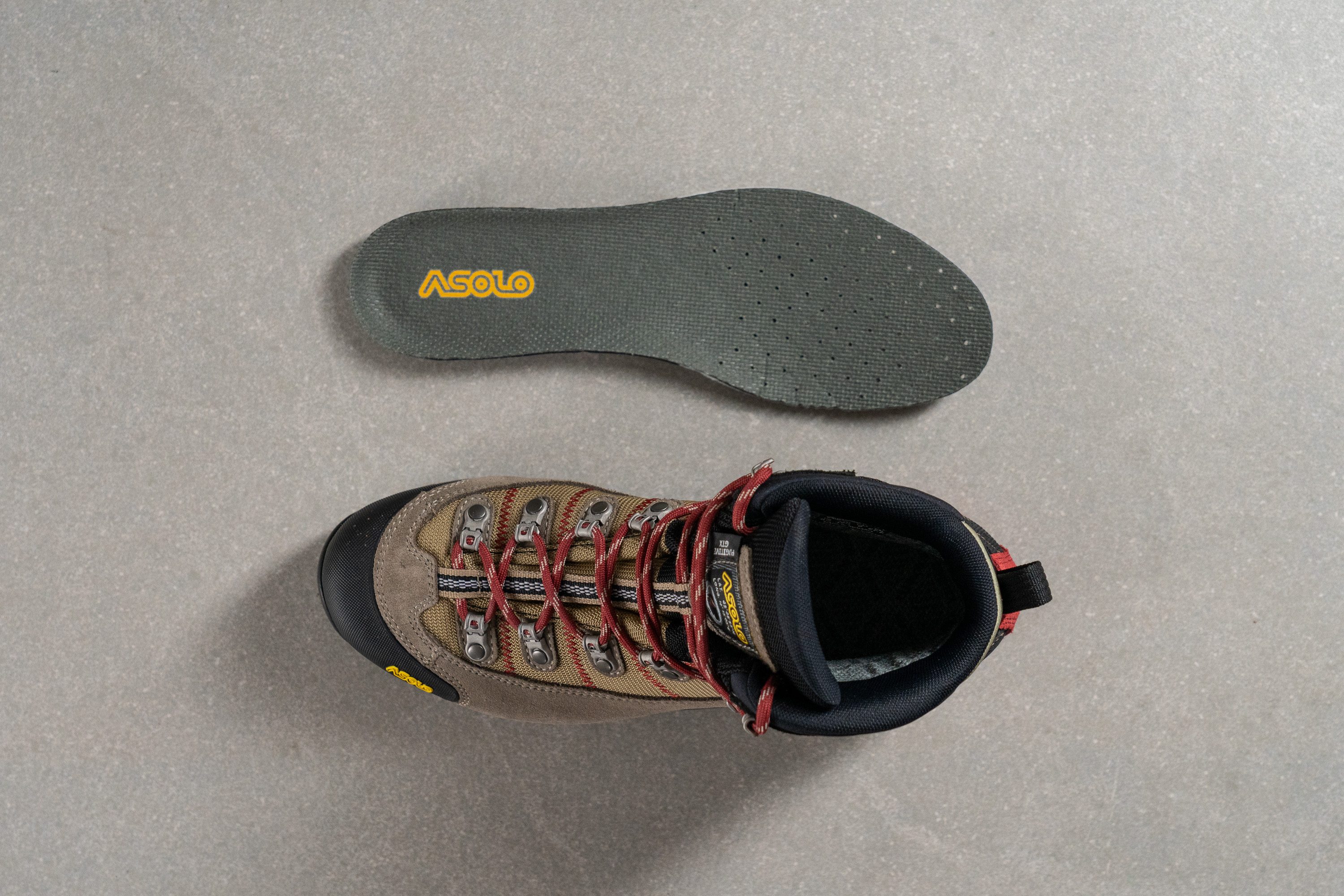
| Fugitive GTX | Yes |
Midsole softness in cold (%)
We popped the Fugitive GTX in our freezer for twenty minutes to simulate exposure to extremely cold conditions, after which we pressed our durometer against the midsole once more and got a harder-than-average reading of 42.3 HA.
However, becoming 26.1% firmer in the cold makes the Fugitive GTX only slightly less consistent than the average hiking boot. As such, it shouldn’t feel too different underfoot as the seasons change.
What’s more, that firmness will do well in offsetting the soft slushiness of snowy trails, making it a great choice for those looking to tackle the tundra.
| Fugitive GTX | 26% |
| Average | 20% |
Reflective elements
The Fugitive GTX doesn’t feature any reflective elements, so we don’t recommend hiking along the side of a road at night without using additional high-vis gear.
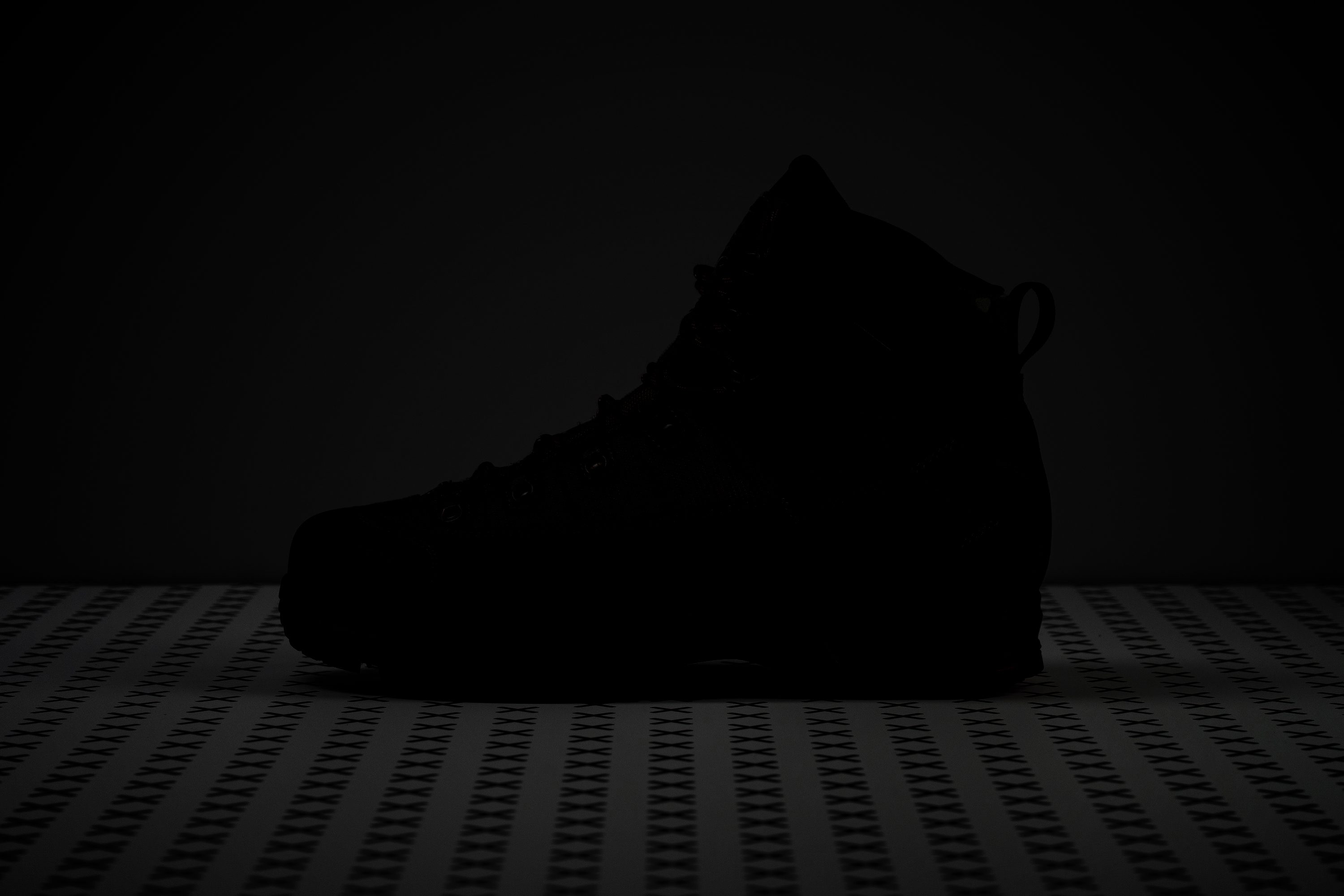
| Fugitive GTX | No |
Tongue padding
The tongue stays true to the Fugitive GTX’s chunky nature at 15 mm thick according to our caliper measurements.
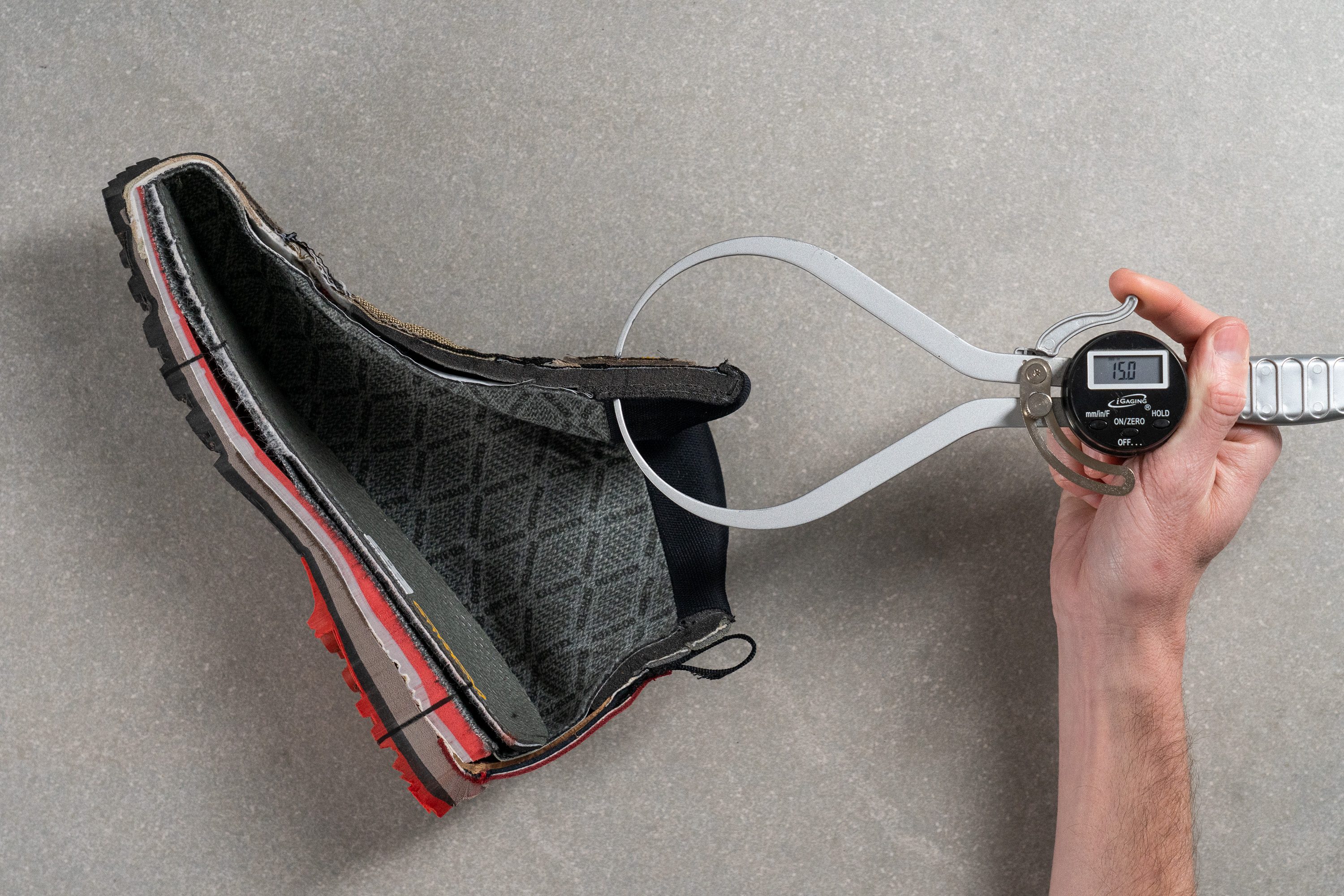
This is quite a bit more padding than found on the average hiking boot and provided us with luxurious levels of comfort within the boot that nicely contrasted the harshness of the terrains we traversed during testing. It also means that we were able to lace the boot tightly and securely to our foot without any hint of lace bite across the instep.
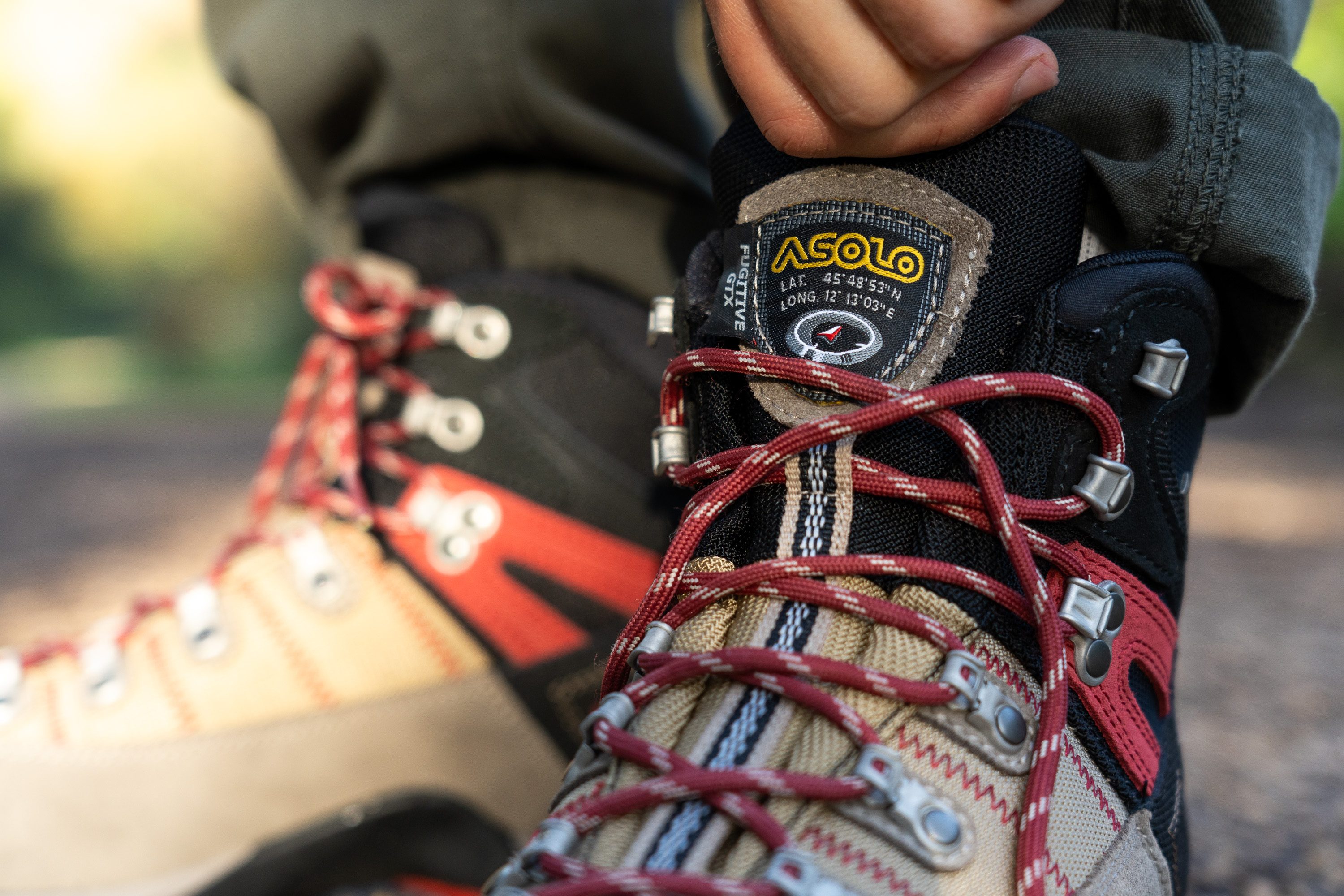
| Fugitive GTX | 15.0 mm |
| Average | 11.2 mm |
Tongue: gusset type
The Fugitive GTX’s tongue is fully gusseted on both sides which successfully prevented any debris from entering the boot during our test hikes.
| Fugitive GTX | Both sides (full) |
Heel tab
The Fugitive GTX has a convenient finger loop at the heel which makes sliding the boot on a little smoother and easier.
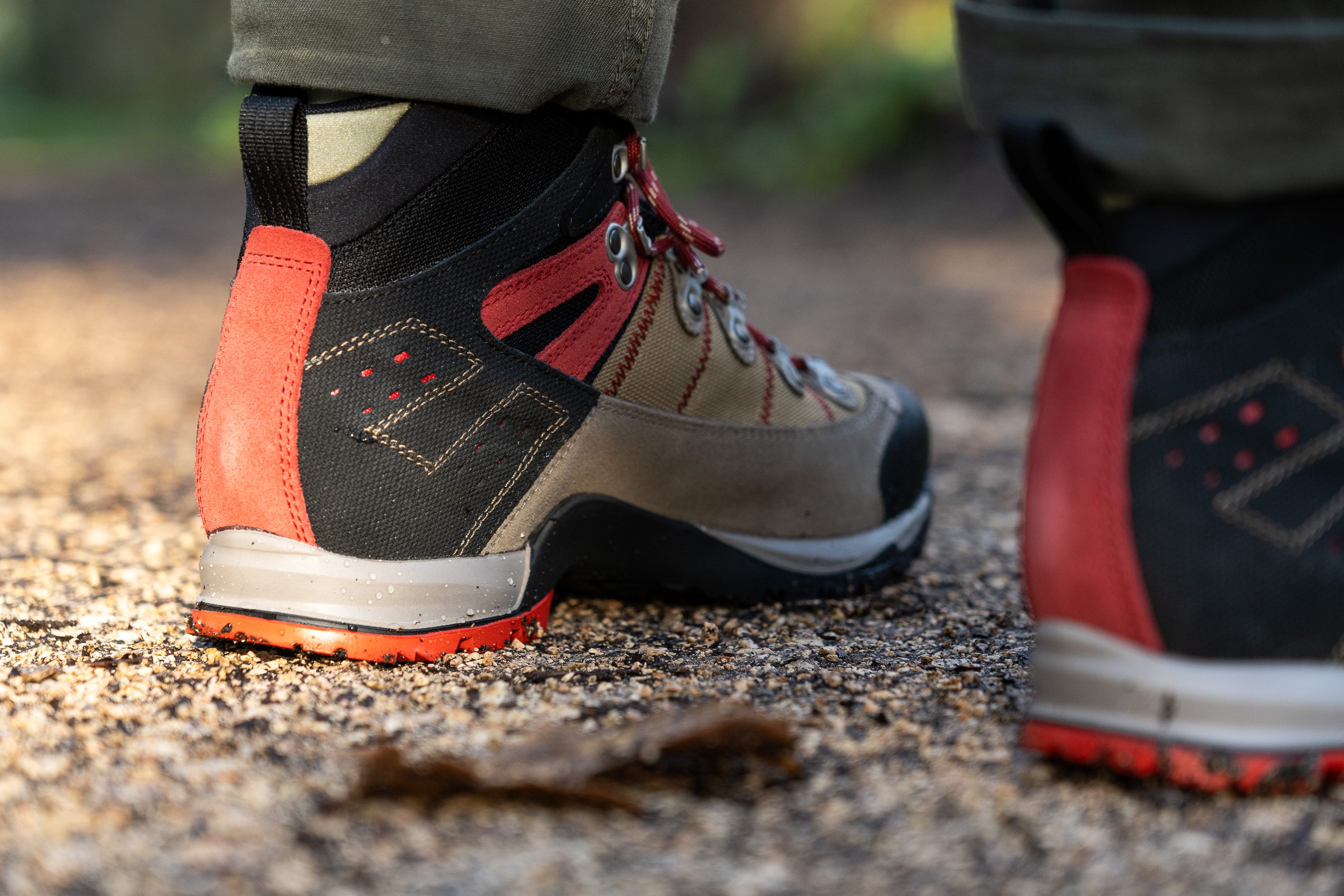
| Fugitive GTX | Finger loop |

